|






Click the flag
Meet our special
U.S. Publishers
|
Trauma & PTSD
Featured
Books in this Category / Main
Booklist

Featured
Books
|
Adopting a Child with a Trauma &
Attachment Disruption History. Theresa Fraser,
$9.95
This booklet is a fact-filled resource
filled with tips and strategies that can be considered before placement as well
as days, weeks and months after your child joins your family. It addresses
day-to-day issues and shows you how to provide the structure that will create
deep family bonds. |
|
After
the Storm: Healing after Trauma, Tragedy and Terror.
Kendall Johnson, $19.50
Kendall Johnson calls this the 'New Age
of Anxiety.' Today we are all challenged with the continual threat
of war, terrorism, job loss, and political uncertainty. How do we
cope? What actions can we take to best respond to personal and social
crises? How do we help our children or the children in our care?
How can we reestablish meaning in our lives? After the Storm shows people how to manage their emotional reactions in an
emergency, stabilize those around them and, in time, work through
the lasting effects of crisis.
- Part I helps readers to understand
the scope of human reaction to overwhelming events.
- Part II explains how the brain deals
with shock, how to understand delayed and complex reactions
to trauma, and how to recognize symptoms of Post-Traumatic
Stress Disorder.
- Part III is devoted to self-care.
It contains an overview of techniques and suggestions for handling
anger, anxiety, extreme grief, withdrawal behavior and numbing.
- Part IV takes you beyond managing
symptoms. The meaning of the event is explored, particularly
as it affects who you are and where you are going.
Also included is a 20-page appendix which
gives instructions for caring for yourself and your family emotionally
during and after a traumatic event. |
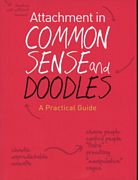
|
Attachment in Common Sense and
Doodles: a Practical Guide. Miriam Silver, $22.95
Attachment is a word used to describe a
simple idea — the relationship with someone you love or whose opinions are
important to you — so why is so much of the language relating to attachment so
obscure, and why is it so challenging to help children who lack healthy
attachment bonds?
ATTACHMENT IN COMMON SENSE AND DOODLES
aims to bring some clarity and simplicity to the subject. Providing grounded
information and advice accompanied by a series of simple 'doodles' throughout,
it explains attachment in language that is easy to understand and describes how
to apply this information in everyday life. It describes how the attachment
patterns in children who are adopted or fostered differ, summarises the latest
research in the field and provides advice on how to repair attachment
difficulties and to build secure, loving relationships.
Covering all of the 'need to know' issues including how to spot attachment
difficulties, build resilience and empathy and responding to problematic
behaviour, this book will be an invaluable resource for families and
professionals caring for children who are fostered, adopted or who have
experienced early trauma. |
Back to top
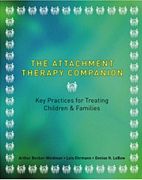
|
The Attachment Therapy Companion: Key
Practices for Treating Children & Families. Arthur
Becker-Weidman, Lois Ehrmann & Denise LeBow, $29.50
Here in a single accessible guide, is a
comprehensive go-to resource on the foundational principles and treatment
guidelines for doing attachment therapy. It provides all the nuts and bolts a
clinician needs to be familiar with to provide effective, informed,
attachment-focused treatment to children and families.
Complex trauma and developmental trauma disorder are also covered in depth, as
well as up-to-date information on how brain science has changed our
understanding of relationships and developmental functioning, and, in turn,
phases of treatment and intervention options. By delineating the standards
of care for treating attachment and trauma disorders, this book provides
clinicians with a comprehensive framework to assess, develop, and evaluate the
best approach to helping their clients. |
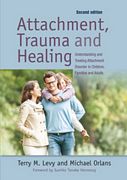
|
Attachment, Trauma, and Healing: Understanding and
Treating Attachment Disorder in Children, Families, and Adults, 2nd Edition.
Terry Levy & Michael Orlans, $49.95
Levy and Orlans' classic text provides a comprehensive
overview of attachment theory, how attachment issues manifest, and how they can
be treated. The book covers attachment-focused assessment and diagnosis,
specialised training and education for caregivers, treatment for children and
caregivers and early intervention and prevention programmes for high-risk
families. The authors explain their unique models of 'corrective attachment
therapy' and 'corrective attachment parenting', and provide practical guidance
on goals and techniques for clinicians who work with maltreated and attachment
disordered children and families. This second edition incorporates advances in
the fields of child and family psychology, with substantial new sections on
interpersonal neurobiology, adult and couple treatment, the application of
positive psychology. |
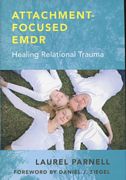
|
Attachment-Focused EMDR: Healing
Relational Trauma. Laurel Parnell, $42.00
Much has been written about trauma and
neglect and the damage they do to the developing brain. But little has been
written or researched about the potential to heal these attachment wounds and
address the damage sustained from neglect or poor parenting in early childhood.
This book presents a therapy that focuses on precisely these areas. Laurel
Parnell, leader and innovator in the field of eye-movement desensitization and
reprocessing (EMDR), offers us a way to embrace two often separate worlds of
knowing: the science of early attachment relationships and the practice of
healing within an EMDR framework. This beautifully written and clinically
practical book combines attachment theory, one of the most dynamic theoretical
areas in psychotherapy today, with EMDR to teach therapists a new way of
healing clients with relational trauma and attachment deficits. |
Back to top
|
|
Becoming an Adoption-Friendly School: a Whole-School
Resource for Supporting Children Who Have Experienced Trauma or Loss. Emma
Gore Langton & Katherine Boy, $45.95
Adopted children who have experienced loss, abuse or
neglect need additional support for their emotional development, and are more
likely to have special educational needs. This useful resource provides a
complete plan for creating adoption-friendly environments in primary, secondary
and specialist schools.
The book is grounded on new research which gathered
together testimonies from over 400 school staff members, adoptive parents and
adoption specialists. With realistic consideration of pressures and limitations
currently faced by schools, it gives advice on eight key areas for school
development, including communicating with parents, training staff, using
resources wisely and recognising children's individual needs. Completing the
toolkit is a broad selection of photocopiable and downloadable plans for
establishing adoption-friendly frameworks, and for demonstrating good practice
to staff, pupils, families and supervisors. |
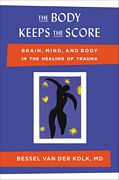
|
The Body Keeps the Score: Brain, Mind, and Body in the
Healing of Trauma. Bessel Van Der Kolk, $24.95
Trauma is a fact of life. Veterans and their families
deal with the painful aftermath of combat; one in five Americans has been
molested; one in four grew up with alcoholics; one in three couples have
engaged in physical violence. Such experiences inevitably leave traces on
minds, emotions, and even on biology. Sadly, trauma sufferers frequently pass
on their stress to their partners and children.
Renowned trauma expert Bessel van der Kolk has spent over three decades working
with survivors. In The Body Keeps the Score, he transforms our
understanding of traumatic stress, revealing how it literally rearranges the
brain’s wiring — specifically areas dedicated to pleasure, engagement, control,
and trust. He shows how these areas can be reactivated through innovative
treatments including neurofeedback, mindfulness techniques, play, yoga, and
other therapies. Based on Dr. van der Kolk’s own research and that of other
leading specialists, The Body Keeps the Score offers proven
alternatives to drugs and talk therapy — and a way to reclaim lives. |
|
|
The Boy Who Built a Wall Around Himself. Ali
Redford, ilustrated by Kara Simpson, $17.95
Boy hides behind his wall because he doesn't trust people
and he knows how it feels to be hurt and let down. That is until Someone Kind
arrives on the other side of his wall. This colour picture book will help
children aged 4-9 who have experienced trauma, loss or neglect to come to terms
with their experiences and to build healthy relationships. |
|
|
The Boy Who Was Raised as a Dog and Other Stories from
a Child Psychiatrist's Notebook: What Traumatized Children Can Teach Us About
Loss, Love, and Healing, Revised Edition. Bruce Perry & Maia
Szalavitz, $22.49
In The Boy Who Was Raised as a Dog, child
psychiatrist Bruce Perry tells stories of trauma and transformation through the
lens of science, revealing the brain's astonishing capacity for healing. Deftly
combining unforgettable case histories with his own compassionate, insightful
strategies for rehabilitation, Perry explains what exactly happens to the brain
when a child is exposed to extreme stress and reveals the unexpected measures
that can be taken to ease a child's pain and help him grow into a healthy
adult. In this deeply informed and moving book, Bruce Perry dramatically
demonstrates that only when we understand the science of the mind can we hope
to heal the spirit of even the most wounded child. |
Back to top
|
|
Caleb's Healing Story: an Interactive Story with
Activities to Help Children to Overcome Challenges Arising from Trauma,
Attachment Issues, Adoption or Fostering. Kathleen Chara & Tasha
Lehner, illustrated by Samantha Aburime, $22.95
Caleb invites the reader to join him on a healing journey
by sharing his own experience of resolving his early trauma. Activities and
worksheets encourage children to participate in their own healing process. The
book explores the key challenges children face and offers easy to use
interventions.
Fully illustrated, it is suitable for children aged 5-14,
as well as their family, friends and those working with children who present
with these issues. It is the ideal companion to A Safe Place for Caleb,
by the same author, which outlines theories, definitions and strategies for
addressing attachment and trauma-related disorders. |
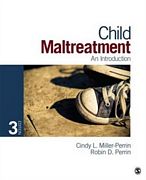
|
Child Maltreatment: an Introduction, 3rd Edition.
Cindy Miller-Perrin & Robin Perrin, $133.95
Uniquely offering both a psychological and sociological
focus, this core text helps students understand more fully the etiology,
prevalence, treatment, policy issues, and prevention of child maltreatment.
This is an ideal core text for advanced undergraduate and graduate students
studying family violence, child maltreatment, family sociology, child welfare,
and social work in the departments of Psychology, Counseling, Sociology, Social
Work, Criminology, and Education. |
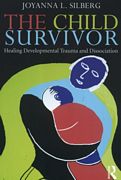
|
The Child Survivor: Healing
Developmental Trauma and Dissociation. Joyanna Silberg, $43.95
THE CHILD SURVIVOR is a clinically
rich, comprehensive overview of the treatment of children and adolescents who
have developed dissociative symptoms in response to ongoing developmental
trauma. Joyanna Silberg, a widely respected authority in the field, uses case
examples to illustrate hard-to-manage clinical dilemmas such as children
presenting with rage reactions, amnesia, and dissociative shut-down. These
behaviors are often survival strategies, and in The Child
Survivor practitioners will find practical management tools that are
backed up by recent scientific advances in neurobiology. Clinicians on the
front lines of treatment will come away from the book with an arsenal of
therapeutic techniques that they can put into practice right away, limiting the
need for restrictive hospitalizations or out-of-home placements for their young
clients. |
|
Children and Adolescents
in Trauma: Creative Therapeutic Approaches. Chris Nicholson,
Michael Irwin & Kedar Nath Dwivedi, $40.95
Children and Adolescents in Trauma presents a variety of creative approaches to working with young people in residential children's homes, secure or psychiatric units, and special schools.
The contributors describe a wide range of approaches, including art therapy and literature, and how creative methods are applied in cases of abuse, trauma, violence, self-harm and identity development. They discuss the impact of abuse and mistreatment upon the mental health of 'looked after' children, drawing links between psychoanalytic theory and practice and the study of literature and the arts. |
Back to top
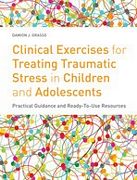
|
Clinical Exercises for Treating
Traumatic Stress in Children and Adolescents: Practical Guidance and
Ready-To-Use Resources. Damion Grasso, $49.95
How do I implement effective strategies
for treating traumatic stress in this particular child or adolescent? CLINICAL
EXERCISES FOR TREATING TRAUMATIC STRESS IN CHILDREN AND ADOLESCENTS COMBINES guidance
for personalizing and implementing effective treatment approaches with
practical materials to use in session. It describes the potential impact of
trauma on children and adolescents, outlines core principles of effective
treatment models, and provides practical guidance for tailoring treatment
strategies to the specific needs of the individual. The featured worksheets and
practical resources are designed to be compatible with evidence-based treatment
models including Trauma-Focused Cognitive Behavioral Therapy (TF-CBT),
Prolonged Exposure, Attachment, Self-Regulation and Competence (ARC), and
Child-Parent Psychotherapy (CPP).
Replete with adaptable, ready-made
materials, this convenient resource will help any clinician working with trauma
exposed 8-18-year-olds to implement effective treatment strategies in practice,
as well as to take a tailored approach that engages them with creative,
therapeutic activities. |
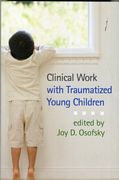
|
Clinical Work with
Traumatized Young Children. Edited by Joy Osofsky, $57.50
Presenting crucial knowledge and
state-of-the-art treatment approaches for working with young children affected
by trauma, this book is an essential resource for mental health professionals
and child welfare advocates. Readers gain an understanding of how trauma
affects the developing brain, the impact on attachment processes, and how to
provide effective help to young children and their families from diverse
backgrounds. Top experts in the field cover key evidence-based
treatments — including child–parent psychotherapy, attachment-based treatments,
and relational interventions — as well as interventions in pediatric, legal, and
community settings. Special sections give in-depth attention to
deployment-related trauma in military families and the needs of children of
substance-abusing parents. |
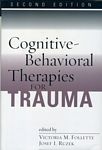
|
Cognitive-Behavioral
Therapies for Trauma, 2nd Edition. Edited by Victoria Follette
& Josef Ruzek, $70.50
Significantly revised and restructured
to reflect major developments in the field, the expanded second
edition of this important work is essentially a new book. The volume
presents cutting-edge cognitive and behavioral applications for
treating a variety of trauma-related symptoms, disorders, and special
populations. Leading scientist-practitioners summarize the available
treatment data and succinctly review the "whys," "whats"
and "hows" of their respective approaches. Nearly all
extant chapters have been completely rewritten, many with new authors,
and new chapters have been added on advances in assessment, acute
stress disorder, complicated grief, cognitive processing therapy,
working with groups, and early intervention. |
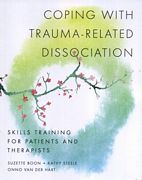
|
Coping with Trauma-Related Dissociation: Skills Training for Patients and Therapists. Suzette Boon, Kathy Steele & Onno van der Hart, $40.50
A patient-oriented manual for complex trauma survivors, this training manual includes short educational pieces, homework sheets, and exercises that address ways in which dissociation interferes with essential emotional and life skills, and support inner communication and collaboration with dissociative parts of the personality. Topics include understanding dissociation and PTSD, using inner reflection, emotion regulation, coping with dissociative problems related to triggers and traumatic memories, resolving sleep problems related to dissociation, coping with relational difficulties, and help with many other difficulties with daily life. The manual can be used in individual therapy or structured groups. |
Back to top
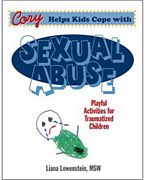
|
Cory Helps Kids Cope with Sexual Abuse: Playful
Activities for Traumatized Children. Liana Lowenstein, $19.95
Liana Lowenstein's latest book offers engaging ways to
work with sexually abused and traumatized children. Creative therapeutic
techniques, including the story of a young child named Cory, effectively bring Trauma-Focused Cognitive Behavioral Therapy
(TF-CBT) to children and their families. |
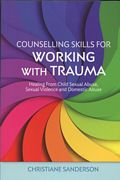
|
Counselling Skills for Working with
Trauma: Healing from Child Sexual Abuse, Sexual Violence, and Domestic Abuse. Christiane Sanderson, $33.95
COUNSELLING SKILLS FOR WORKING WITH
TRAUMA is a practical, introductory guide to counselling survivors of child
abuse, neglect, rape, sexual violence, sexual trafficking, religious sexual
abuse, and domestic abuse. Written in an accessible style, it provides a
comprehensive introduction to complex trauma accompanied by advice on how to
create a safe environment in which survivors can learn the skills to restore
control over trauma symptoms, to aid healing and post traumatic growth. The book
covers all of the key principles including: understanding the role of
dissociation in complex trauma; the role of attachment; managing flashbacks,
panic attacks, nightmares and dissociation; responding to shame and guilt;
managing relationships; and the impact of working with complex trauma. It
explores how practitioners can work more effectively with trauma, and offers
techniques and skills which can easily be integrated into different therapeutic
models. |
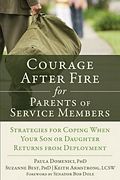
|
Courage After Fire for Parents of
Service Members: Strategies for Coping When Your Son or Daughter Returns from
Deployment. Paula Domenici, Suzanne Best &
Keith Armstrong, $19.95
Parents of returning service members may
sometimes feel that their voices are not heard. The media is saturated with
stories about troops returning from deployment with mental and physical health
problems. Almost all returning service members experience reintegration
challenges such as readjusting to family and community, finding employment or
attending school. Rarely do we hear how parents are taking on the role of
supporting their sons and daughters who have served our country. In countless
ways these parents provide help-and when their military child suffers
significant physical or psychological injuries, they may once again become
their primary caretaker. For mothers and fathers and others in a parenting
role, it can be overwhelming at times, and resources are limited.
COURAGE AFTER FIRE FOR PARENTS OF SERVICE
MEMBERS provides a compassionate and accessible guide for the parents or
guardians of returning troops. This groundbreaking book acknowledges the
significant contribution and sacrifice parents have made for their military
children, provides strategies and resources that will assist them in
understanding and supporting their son or daughter, and will validate their own
personal experiences. Even in the best of circumstances, parents play an
instrumental role in helping their sons and daughters successfully reintegrate
after deployment. This book is a valuable resource for any parent who is
seeking to better understand and support a returning military child while
caring for themselves. |
Back to top

|
Creating
Capacity for Attachment: Dyadic Developmental Psychotherapy
in the Treatment of Trauma-Attachment Disorders. Arthur
Becker-Weidman
& Deborah Shell, $35.95
A comprehensive book about Dyadic
Developmental Psychotherapy — a gentle, holistic, therapeutic
approach designed to resolve trauma in children who have experienced
abuse, neglect, loss, or other extreme challenges to primary
relationships. Respected professionals offer practical strategies
for treating and parenting children with trauma and attachment
disorders that include the following:
- An Introduction to Dyadic Developmental
Psychotherapy
- Dyadic Developmental Psychotherapy:
the Theory
- Therapy with Attachment-Ready Parents
- Therapy for Children in Alternate
Placements
- Implementing Attachment Models in
a Residential
- Working with Unresolved Parents
- Therapist Use of Self
- Chapter for Parents / Adoptive parents
who have completed treatment
- History, Development & Training
of the DDP Model
|
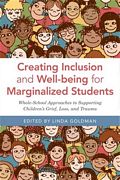
|
Creating Inclusion and Well-Being for Marginalized
Students: Whole-School Approaches to Supporting Children's Grief, Loss, and
Trauma. Edited by Linda Goldman, $45.95
It is increasingly challenging for teachers to educate
without a deeper understanding of their students' life experiences. This is
particularly the case in marginalised groups of young people who are subject to
loss, grief, trauma and shame. Through a snapshot of the diverse student
populous, this book explores the impact of these experiences on a student's
learning and success. Topics covered include poverty, obesity, incarceration,
immigration, death, sexual exploitation, LGBT issues, psychodrama, the
expressive arts, resilience, and military students, and community outreach. The
authors share the children's perspective, and through case studies they offer
solutions and viable objectives. |
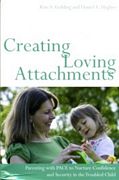
|
Creating Loving Attachments:
Parenting with PACE to Nurture Confidence and Security in the Troubled
Child. Daniel Hughes & Kim Golding, $33.95
All children need love, but for troubled
children, a loving home is not always enough. Children who have experienced
trauma need to be parented in a special way that helps them feel safe and
secure, builds attachments and allows them to heal.
Playfulness, acceptance, curiosity and
empathy (PACE) are four valuable elements of parenting that, combined with
love, can help children to feel confident and secure. This book shows why these
elements are so important to a child's development, and demonstrates to parents
and carers how they can incorporate them into their day-to-day parenting. Real
life examples and typical dialogues between parents and children illustrate how
this can be done in everyday life, and simple stories highlight the ideas
behind each element of PACE.
This positive book will help parents and
carers understand how parenting with love and PACE is invaluable to a child's
development, and will guide them through using this parenting attitude to help
their child feel happy, confident and secure. |
Back to top
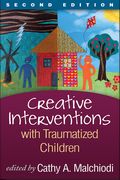
|
Creative Interventions with Traumatized Children, 2nd
Edition. Edited by Cathy Malchiodi
A trusted, bestselling resource, this volume demonstrates
a range of creative approaches for facilitating children's emotional reparation
and recovery from trauma. Experts in play, art, music, movement, and drama
therapy, as well as bibliotherapy, describe step-by-step strategies for working
with children, families, and groups. Rich with case material and artwork, the
book is both practical and user-friendly. Specific types of stressful
experiences include parental loss, child abuse, family violence, bullying, and
mass trauma. Important developments in neurobiology, self-regulation, and
resilience and posttraumatic growth are highlighted in this substantial
revision. |
|
|
Cyril Squirrel Finds Out about Love. Jane Evans,
illustrated by Izzy Bean, $19.95
Helping children to learn about the ways that love can
look, sound or feel, this heart-warming picture book shows some of the many different
forms love, friendship and kindness take. Suitable for all children aged 2-6,
especially those who may have confused ideas about love, Cyril's adventure
includes guidance for adults on how the book can be read with children. |
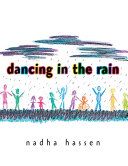
|
Dancing In the Rain. Nadha Hassen, $18.50 
A diverse group of children and their families are faced
with difficulties, trauma, and change. Individually and together, they work to
overcome these problems, and understand that life is to be celebrated. |
Back to top
|
|
Does My Child Have PTSD? What to Do When Your Child Is
Hurting from the Inside Out. Jolene Philo, $22.95
Is it possible that the struggles you have with your
child may be because he or she suffers from post-traumatic stress disorder
(PTSD)? Once ignored, even by the medical professionals treating war veterans,
PTSD is gaining global recognition as a very real and serious issue for those
who have experienced traumatic events, even children. When children
experience medical illness, witness violence, or are abused, it can leave a
lasting effect. According to recent studies, 50 to 60 percent of children who
experience these traumas early in life may suffer from a form of PTSD, leading
to issues in childhood, through adolescence, and even into adulthood. Does
My Child Have PTSD? is designed for readers looking for answers about
the puzzling, disturbing behaviors of children in their care.
With years of research and personal experience, Philo
provides critical information to help people understand causes, symptoms,
prevention, and effective diagnosis, treatment, and care for any child
struggling with PTSD. |
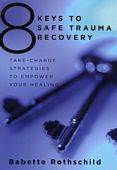
|
8 Keys to Safe Trauma
Recovery: Take Charge Strategies to Empower Your Healing. Babette
Rothschild, $21.00
Psychotherapist Babette Rosthschild emphasis an approach to recovery
that helps you to recognize your own individual needs and evaluate
whether they are being met, giving you the necessary tools to
navigate your own safe road to recovery. |
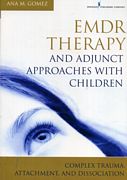
|
EMDR Therapy and Adjunct Approaches
with Children: Complex Trauma, Attachment, and Dissociation. Ana Gomez, $60.50
This book provides a wide range of
leading-edge, step-by-step strategies for clinicians using EMDR therapy and
adjunct approaches with children with severe dysregulation of the affective
system. The book offers developmentally appropriate and advanced tools for
using EMDR therapy in treating children with complex trauma, attachment wounds,
dissociative tendencies, and compromised social engagement. The book also
presents the theoretical framework for case conceptualization in EMDR therapy
and in the use of the Adaptive Information Processing (AIP) model with
children.
A unique and innovative feature of this
book is the masterful integration of strategies from other therapeutic
approaches, such as Play therapy, Sandtray therapy, Sensorimotor psychotherapy,
Theraplay and Internal Family Systems (IFS), into a comprehensive EMDR
treatment maintaining appropriate adherence to the AIP model and EMDR therapy
methodology. |
Back to top
|
Emotional and Physical Trauma and Its Impact on
Breastfeeding Mothers: Clinics in Human Lactation, Volume 14. Dianne
Cassidy, $20.95
Emotional and physical trauma have a role in breastfeeding
success. But even though a mother may know that breastfeeding is best,
past abuse, physical trauma, or psychological impairment may affect a mother’s
ability to initiate or continue breastfeeding. Since more than 20-25% of
women have been sexually abused, 25% have experienced intimate
partner violence, more than 50% of adolescent mothers have experienced
childhood sexual abuse, with an untold number of mothers and babies who
have experienced birth trauma, it is likely that all health providers who
work with moms and babies have clients that have experienced some form of
abuse.
In Emotional and Physical Trauma and Its Impact
on Breastfeeding Mothers, author Dianne Cassidy describes the
different kinds of trauma and discusses ways to work with these moms.
Sometimes this means helping them breastfeed, other times this means
supporting whatever feeding decision works best for them and their situation.
At all times it includes listening to the mom, watching for red flags,
asking questions, and building her trust. |
|
Empathic Care for Children with
Disorganized Attachments: a Model for Mentalizing, Attachment and
Trauma-Informed Care. Chris Taylor, $33.95
Disorganized attachment is the most
extreme form of insecure attachment. Synthesizing attachment, trauma and
mentalization theory into a useful practice model, EMPATHIC CARE FOR CHILDREN
WITH DISORGANIZED ATTACHMENTS proposes ways of meeting the needs arising in
children and young people with disorganized attachments. Focusing on the
importance of interpersonal bonds to facilitate the child's capacity to
mentalize, it aims to equip the reader with the appropriate skills to provide
effective, sustained and, most importantly, empathic care to the most
vulnerable and troubled children. This useful guide will be invaluable to
health and social care professionals including residential carers, therapists,
counsellors, and those working with vulnerable and troubled children and young
people including those supporting foster and adoptive families. |
|
Empowering Children through Art and Expression: Culturally
Sensitive Ways of Healing Trauma and Grief. Bruce St. Thomas
& Paul Johnson, $29.95
Empowering Children through Art and
Expression examines the successful use of arts and expressive
therapies with children, and in particular those whose lives have
been disrupted by forced relocation with their families to a different
culture or community. This book will be a valuable resource for
professionals working with traumatized children who have experienced
loss, grief, relocation and other kinds of trauma. |
Back to top
|
Getting Past Your Past: Take Control of Your Life
with Self-Help Techniques from EMDR Therapy.
Francine Shapiro, $18.99
Whether we¹ve experienced small setbacks
or major traumas, we are all influenced by memories and experiences we may not
remember or don't fully understand. GETTING PAST YOUR PAST offers practical
procedures that demystify the human condition and empower readers looking to
achieve real change.
Shapiro, the creator of EMDR (Eye
Movement Desensitization and Reprocessing), explains how our personalities
develop and why we become trapped into feeling, believing and acting in ways
that don't serve us. Through detailed examples and exercises readers will learn
to understand themselves, and why the people in their lives act the way they
do. Most importantly, readers will also learn techniques to improve their
relationships, break through emotional barriers, overcome limitations and excel
in ways taught to Olympic athletes, successful executives and performers.
An easy conversational style, humor and
fascinating real life stories make it simple to understand why we get stuck in
various ways and what to do about it. Don't let yourself be run by unconscious
and automatic reactions. Learn how to take control of your life. |
|
Grief and Trauma in Children: an Evidence-Based
Treatment Manual. Alison Salloum, $53.95
Grief and Trauma in Children provides
easy-to-implement, ready-to-use therapy materials to help busy practitioners
use grief and trauma interventions in real-world settings. All interventions in
the book have been developed and researched with clinicians who faced
challenging environments, including devastating natural disasters, and in
communities where ongoing violence victimized children directly. Even in these
stressful environments, clinicians found the interventions easy to implement,
effective in helping children acquire coping skills, and effective in
decreasing traumatic symptoms in order to proceed with grieving without
impaired functioning.
Grief and Trauma in Children blends
cognitive-behavioral therapy methods and narrative practices to present an
integrated grief and trauma model that can be delivered individually, to a
group of children, or to a family. The book uses the Draw, Discuss, Write,
Witness (DDWW) method to help children explore narratives of resilience and
build coping capacity, engage in restorative stories about what happened, and
reconnect and reengage in meaningful ways that allow the child to enjoy life
again and get back on-track developmentally. Grief and Trauma in
Children also provides up-to-date research on childhood bereavement
and trauma, a brief description of the theoretical framework of the Grief and
Trauma Intervention (GTI) model, a description of session-by-session goals and
activities, case examples with ways to address common challenges, and
photocopiable tools for clinicians to easily implement the model, such as
session agendas, fidelity checklists, handouts for parents, and activity sheets
for children. |
Back to top
|
|
Healing Child Trauma through Restorative Parenting.
Chris Robinson & Terry Philpot, $33.99
Healing Child Trauma Through Restorative Parenting details how children can be helped to recover with the use of Restorative
Parenting, an innovative model informed by psychological and neurological
understanding of trauma and its effects. It explains the critical role that
people, relationships and the environment play in a child's recovery. It shows
what constitutes a therapeutic environment, whereby a child experiences therapy
not as one-to-one sessions but as a lived experience. The authors show how
other components of the model - building therapeutic relationships, promoting
positive education and encouraging clinically informed life style choices - are
intimately linked, each critical to the re-parenting which the child undergoes.
This book will be welcomed by professionals working with
children, including those in residential, health and foster care, psychology,
education and health, as well as those commissioning services. The models,
concepts and practices are transferable to public, private and charitable
agencies. |
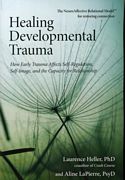
|
Healing Developmental Trauma: How Early Trauma
Affects Self-Regulation, Self-Image, and the Capacity for Relationship. Laurence Heller & Aline LaPierre, $25.95
Clinicians Laurence Heller and Aline
LaPierre introduce the NeuroAffective Relational Model® (NARM), a unified
approach to developmental, attachment, and shock trauma that, while not
ignoring a person’s past, emphasizes working in the present moment.
NARM is a somatically based
psychotherapy that helps bring into awareness the parts of self that are
disorganized and dysfunctional without making the regressed, dysfunctional
elements the primary theme of the therapy. It emphasizes a person’s strengths,
capacities, resources, and resiliency and is a powerful tool for working with both
nervous system regulation and distortions of identity such as low self-esteem,
shame, and chronic self-judgment. |
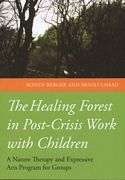
|
The Healing Forest in Post-Crisis
Work with Children: a Nature Therapy and Expressive Arts Program for Groups. Ronen Berger & Mooli Lahad, $33.95
Nature Therapy is an innovative approach
for working with children who have experienced stress or trauma. This book
presents the theory behind the approach along with detailed guidelines for
introducing it to the classroom and other group settings. The flexible
12-session programme pairs nature-based activities with storytelling and other
expressive arts approaches. It is designed to strengthen coping and resilience
in children who have been through common causes of stress such as the divorce
of parents, moving, the illness of a loved one, or bullying. It can also be
used in the aftermath of large-scale crises such as war, terrorism and natural
disasters to prevent and treat post-traumatic stress disorder. An evocative
colour storybook, 'The Guardians of the Forest', is also included for use
within the programme. |
Back to top
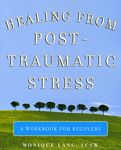
|
Healing
from Post-Traumatic Stress: a Workbook for Recovery. Monique
Lang, $23.95
Healing from Post-Traumatic Stress is an effective, life-affirming guide to help you get through your
traumatic experience. Written by an experienced psychotherapist
this informative guide with a user-friendly format invites you to
participate in the process of your recovery, using simple anxiety-reducing
exercises, revealing questions, yoga and meditation tools, art therapy,
writing, and other therapeutic techniques. |
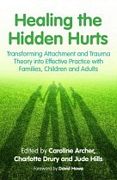
|
Healing the Hidden Hurts: Transforming Attachment and
Trauma Theory into Effective Practice with Families, Children, and Adults. Edited
by Caroline Archer, Charlotte Drury & Jude Hills, $35.95
With contributions from social workers, adoptive parents,
adoptees, psychologists, therapists, counsellors and other related
professionals, this book provides a varied and expansive approach to explaining
attachment theory. The authors speak from personal experience to deliver
explanations of theory, how they relate to practice and to provide practical
guidance on how to improve the physical, emotional and psychological
development of children in care across a broad range of professional
settings.
This book provides valuable insights relevant to practitioners within the
fields of social work, health, education, the criminal justice system and any
independent and voluntary sectors working with children and families. |
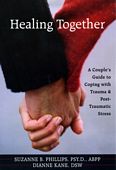
|
Healing Together: a Couple’s Guide to Coping with Trauma & Post-Traumatic Stress. Suzanne Phillips & Dianne Kane, $21.95
When one or both partners in a relationship experience a major traumatic event, the strain can really put the relationship in jeopardy; Healing Together offers couples simple techniques for communicating, regaining trust, and supporting one another through the process of trauma recovery. |
Back to top
|
|
Healing Traumatized Children: Navigating Recovery for
Children with Turbulent Pasts. Faye Hall, Jeff Merkert & John Biever,
$23.50
Healing Traumatized Children authors Hall,
Merkert and Biever have successfully merged mental health, trauma and
attachment, parenting and in-home treatment strategies into a single,
comprehensive resource for parents and professionals. Hall and Merkert
emphasize the importance of an in-home plan (where the healing must begin),
outline how to effectively assemble a support network, provide the keys to the
establishment of a therapeutic home environment, discuss psycho-education that
identifies the six distinct Trauma Disrupted Competencies and provide multiple
types of healing interventions.
The authors reveal that without effective in-home
intervention, many of these children will become involved in juvenile and adult
justice systems and continue the intergenerational transmission of maladaptive
relationships, abuse and neglect. It is important to remember that many of
these children will eventually become tomorrow’s parents. |
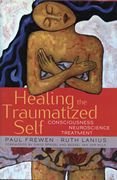
|
Healing the Traumatized Self: Consciousness,
Neuroscience, Treatment. Paul Frewen & Ruth Lanius, $48.00
Cultivation of emotional awareness is difficult, even for
those of us not afflicted by serious mental illness. This book discusses the
neurobiology behind emotional states and presents exercises for developing self
awareness. Topics include mood (both unipolar and bipolar), anxiety
(particularly PTSD), and dissociative disorders.
Frewen and Lanius
comprehensively review psychological and neurobiological research, and explain
how to use this research to become aware of emotional states within both normal
and psychopathological functioning. Therapists will be able to help survivors
of trauma, mood disorders, anxiety disorders, and dissociative disorders
develop emotional awareness. The book also includes case studies, detailed
instructions for clinicians, and handouts ready for use in assessment/therapy
with patients/clients. |
|
Health Consequences of Abuse in the Family: a
Clinical Guide for Evidence-Based Practice. Edited
by Kathleen Kendall-Tackett, $26.95
HEALTH CONSEQUENCES OF ABUSE IN THE
FAMILY translates research into practice by examining the intersection of
family violence and health. Specifically this volume looks at the healthcare
needs of people who have experienced abuse and subsequently have related
chronic diseases and conditions.
HEALTH CONSEQUENCES OF ABUSE IN THE
FAMILY broadly summarizes research and clinical cases and offers practical
suggestions to the psychologists and other healthcare providers working in a
variety of settings. Chapters address the implications for clinical practice as
well as review relevant studies and provide additional resources. In addition,
the special needs of children with disabilities, elders, and women are
discussed. |
Back to top
|
Helping Babies and Children 0-6 to Heal After Family
Violence: a Practical Guide to Infant- and Child-Led Work. Wendy Bunston,
$37.95
This accessible guide shows social workers and
counsellors how to work effectively with very young children who have
experienced domestic violence. Based on neurobiological research and over 25
years' experience in the field, it demonstrates how to deliver successful
child-led therapy and work with the whole family to help each child to heal. |
|
Helping Children to Tell about Sexual Abuse: Guidance
for Helpers. Rosaleen McElvaney, $26.95
Practical and accessible, this book offers guidance on
how professionals can identify potential abuse cases and create safe
opportunities for children to talk about sexual abuse. The book explores
challenges in facilitating and responding to disclosures of abuse, such as: how
to recognise the signs, ask the right questions and react to a disclosure. It
also draws on research carried out with children who have experienced sexual
abuse, to convey how experiences of disclosure feel to those making them and
what informs a decision to tell or not tell.
Helping Children to Tell About Sexual Abuse will
be suitable for any professional working with a child or young person,
including social workers, psychologists, child/family therapists, health care
workers, school nurses, school counsellors, health visitors, police and youth
workers. |
|
Helping Kids Heal: 75
Activities to Help Children Recover from Trauma and Loss. Rebecca
Carman, $53.95
This unique volume contains 75 proven activities to use with school-age
children after an acutely traumatic event or in response to chronic
trauma or loss. Each of these illustrated activities has clear, step-by-step
instructions and valuable anecdotes and tips, making the underlying
therapeutic principles come to life. All activity sheets are reproducible. |
|
Helping Them Heal: How Teachers Can Support Young
Children Who Experience Stress and Trauma. Karen Peterson, $23.95
A young child’s brain is uniquely sensitive to the
effects of stress and trauma, which can have detrimental, long-term
developmental impact. HELPING THEM HEAL provides answers, ideas, and
specific classroom strategies to move trauma-affected children in positive
directions. Educators will learn ways to help children build resilience,
self-regulation, and self-competence using this sensitive, supportive, and
practical guide. |
Back to top
|
Hope
& Healing: a Caregiver’s Guide to Helping Young Children Affected
by Trauma. Kathleen Fitzgerald Rice & Betsy McAlister
Groves, Zero to Three Early Care Library, $22.95
Hope and Healing is a guide
for early childhood professionals who care for children in a variety
of early care and education settings. The authors define trauma
and help readers recognize its effects on young children. They also
offer tips, resources and proven intervention strategies for working
with traumatized children and their families and for managing stress. |
|
Improving Sensory Processing in Traumatized Children:
Practical Ideas to Help Your Child's Movement, Coordination, and Body
Awareness. Sarah Lloyd, $19.95
Early trauma and neglect can have a profound effect upon
a child's development. Sensory integration theory offers a way of understanding
how the brain processes and stores movement experience, and how these
experiences manifest at a physical and emotional level. This book explains how
early movement experiences affect brain development and gives examples of how
trauma can prevent basic sensory processing pathways from being correctly
established. It shows how you can identify gaps in normal sensory development
and offers ideas for how you can use physical activities to help build up the
underdeveloped systems. Good bodily awareness forms the foundation of motor
development as well as social and emotional skills and learning. This book will
help your child to be more in tune with themselves and their bodies and feel
more comfortable in their environment.
Highly accessible with lots of practical tips and
examples, this book is written for adoptive and foster parents, and will also
be useful for social workers, fostering and adoption workers and those working
in primary and early years educational settings. |
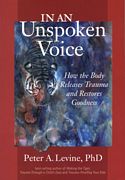
|
In an Unspoken Voice: How the Body
Releases Trauma and Restores Goodness. Peter
Levine, $24.95
Peter Levine draws on his broad
experience as a clinician, a student of comparative brain research, a stress scientist
and a keen observer of the naturalistic animal world to explain the nature and
transformation of trauma in the body, brain and psyche. IN AN UNSPOKEN
VOICE is based on the idea that trauma is neither a disease nor a
disorder, but rather an injury caused by fright, helplessness and loss that can
be healed by engaging our innate capacity to self-regulate high states of
arousal and intense emotions. Enriched with a coherent theoretical framework
and compelling case examples, the book elegantly blends the latest findings in
biology, neuroscience and body-oriented psychotherapy to show that when we
bring together animal instinct and reason, we can become more whole human
beings. |
|
|
Innovative Therapeutic Life Story Work: Developing
Trauma-Informed Practice for Working with Children, Adolescents and Young
Adults. Edited by Richard Rose, $39.95
Life story work is an approach designed to enable
traumatized children to explore, question and understand the past events of
their lives. It aims to secure their future by strengthening attachment with
their carers and providing the opportunity to develop a healthy sense of self
and a feeling of wellbeing.
This new edited volume documents innovative ways in which
life story work has been developed. It draws on the work of nine life story
centres based around the world and provides understanding and guidance for
those working with children who have experienced trauma. The book illustrates
current theory and practice and looks at how the approach is being used in a
variety of settings including schools, intensive services, youth justice, and
post-adoption support, highlighting its versatility. The importance of
trauma-informed practice when working with vulnerable children is emphasised
throughout, to help practitioners provide the best for the children in their
care. |
Back to top
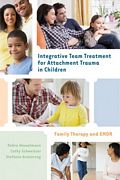
|
Integrative Team Treatment for Attachment Trauma in
Children: Family Therapy and EMDR. Debra Wesselmann, Cathy Schweitzer &
Stefanie Armstrong, $38.95
Loss of a parent, separations, abuse, neglect, or a
history of a difficult foster or orphanage experience can lead to profound
emotional dysregulation and mistrust in children. Working with these
children — many of whom have experienced multiple traumas and losses — can feel
overwhelming. Clinicians must navigate complex case management decisions and
referrals, address the needs of parents and schools, not to mention ameliorate
the traumatic memories and severe behaviors that present in the kids.
By working as a collaborative team, EMDR and family therapists can, together,
strengthen the parent-child attachment bond and help to mend the early
experiences that drive the child’s behavior. This book, and its accompanying
Parent Manual, are intended to serve as clear and practical treatment guides,
presenting the philosophy and step-by-step protocols behind the Integrative
Team Treatment approach, so both the family system issues and the child’s
traumatic past are effectively addressed. You need not be a center specializing
in attachment trauma to implement this team model, nor must members of the team
practice at the same location. With at least one fully-trained EMDR
practitioners as part of the two-person team, any clinician can pair with
another to implement this treatment approach, and heal children suffering from
attachment trauma.
Also available:
Integrative Parenting: Strategies for Raising Children
Affected by Attachment Trauma. Debra Wesselmann, Cathy Schweitzer &
Stefanie Armstrong, $25.95
Designed as a manual to complement the clinician’s guide,
this book is written for birth, foster, or adoptive parents, aunts and uncles,
grandparents, or anyone who may be raising a child who has experienced
attachment loss and trauma. Their severe behaviors can often leave caregivers
feeling confused, frightened, hurt, and overwhelmed, as they struggle to make
sense of a massive amount of information — and misinformation — that exists on
attachment issues. This book provides understanding, validation, and solutions
for these caregivers. In it, the authors explain their innovative model of
“team” treatment that includes an EMDR therapist and a family therapist. Best
used in conjunction with therapeutic help, it walks readers through an array of
parenting strategies that will lead them to a deeper understanding of their
traumatized child, and better enable them to calm their behavior and improve
their attachment security so they can heal. |
|
|
It Didn't Start with You: How Inherited Family Trauma
Shapes Who We Are and How to End the Cycle. Mark Wolynn, $37.00
Depression. Anxiety. Chronic Pain. Phobias. Obsessive
thoughts. The evidence is compelling: the roots of these difficulties may not
reside in our immediate life experience or in chemical imbalances in our
brains — but in the lives of our parents, grandparents, and even
great-grandparents. The latest scientific research, now making headlines,
supports what many have long intuited — that traumatic experience can be passed
down through generations. These emotional legacies are often hidden, encoded in
everything from gene expression to everyday language, and they play a far
greater role in our emotional and physical health than has ever before been
understood.
It Didn’t Start with You builds on the work of
leading experts in post-traumatic stress, including Mount Sinai School of
Medicine neuroscientist Rachel Yehuda and psychiatrist Bessel van der Kolk,
author of The Body Keeps the Score. As a pioneer in the field of inherited
family trauma, Mark Wolynn has worked with individuals and groups on a
therapeutic level for over twenty years.
It Didn’t Start with You offers a pragmatic and
prescriptive guide to his method, the Core Language Approach. Diagnostic
self-inventories provide a way to uncover the fears and anxieties conveyed
through everyday words, behaviors, and physical symptoms. Techniques for
developing a genogram or extended family tree create a map of experiences going
back through the generations. And visualization, active imagination, and direct
dialogue create pathways to reconnection, integration, and reclaiming life and
health. It Didn’t Start With You is a transformative approach to
resolving longstanding difficulties that in many cases, traditional therapy,
drugs, or other interventions have not had the capacity to touch. |
Back to top
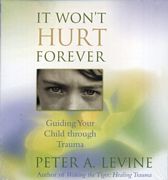
|
It Won’t
Hurt Forever: Guiding Your Child through Trauma. Peter
Levine, $26.95 2-CD set
Your child has just experienced a distressing event: a bicycle fall, a medical procedure, a frightening encounter with a dog. What do you do? Stress researchers now know that after a painful or fearful experience, children may endure such symptoms as unexplainable pain, nightmares, bedwetting, nervousness, aggression, and other problems and a child may suffer long after the event.
Now, with this groundbreaking audio-learning program for parents and caretakers, you can gain the skills you need to help a child recover from frightening events in a healthier, more natural way using the body's own healing mechanisms. With It Won't Hurt Forever, you will learn how to activate this priceless resource within any child in need. Includes 18-page study guide and 10 full-color illustrations. |
|
Life After Trauma:
a Workbook for Healing, Second Edition. Dena Rosenbloom
& Mary Beth Williams, $21.50
Trauma can turn your world upside down—afterward, nothing may look safe or familiar. This compassionate workbook is full of practical strategies for coping and self-care, guiding you toward reclaiming a solid sense of safety, self-worth, trust, and control, as well as the capacity to be close to others. The focus is on finding the way forward in your life today, no matter what has happened in the past. The updated second edition has a new section on managing emotions through mindfulness and an appendix on easing the stress of health care visits. Dozens of step-by-step questionnaires and exercises are included. |
|
Life Story Therapy with
Traumatized Children: a Model for Practice. Richard Rose, $35.95
Life Story Therapy is an approach
designed to enable children to explore, question and understand the past events
of their lives. It aims to secure their future through strengthening attachment
with their carers and providing the opportunity to develop a healthy sense of
self and a feeling of wellbeing.
This comprehensive overview lays out the
theory underlying life story therapy, including an accessible explanation of
contemporary research in neurobiology and trauma. Featuring tried and
tested ideas, with tools and templates illustrated through instructive
case studies, the author identifies how life story therapy can be implemented
in practice. Finally, the relationships between life story therapy
and traditional 'talking' therapies are explored.
LIFE STORY THERAPY WITH TRAUMATIZED
CHILDREN is essential reading for those working with children and adolescents,
including social workers, teachers, child psychotherapists, residential care
staff, long-term carers, psychologists and other professionals. |
Back to top
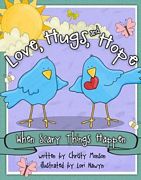
|
Love, Hugs, and Hope: When Scary Things
Happen. Christy Monson, illustrated by Lori Nawyn,
$23.95
LOVE, HUGS, AND HOPE: WHEN SCARY THINGS
HAPPEN is an invaluable tool for helping children identify feelings that
overwhelm them with anxiety and despair. Written after the tragic shooting in Newtown,
Connecticut, author Christy Monson guides readers through emotions of fear,
sadness, and anger, and then lends constructive and practical ideas for how to
manage such feelings and seek comfort. Lori Nawyn’s engaging illustrations help
young children understand that hope is only a hug away. |
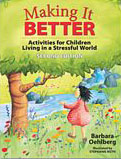
|
Making it Better: Activities for Children Living in a
Stressful World, 2nd Edition. Barbara Oehlberg, $28.95
Speaking to the concept of “trauma-informed” early
childhood education, this book responds to the learning and behavioral needs of
children who have experienced traumatic events or toxic stress — such as natural
disasters, community violence, abuse or neglect within the child's familial
relations, and more. In addition to more than 75 empowering and healing
classroom activities, there is information to help you understand the impact of
children's disrupted attachments and early insecurities, as well as strategies
to help children build resilience. |
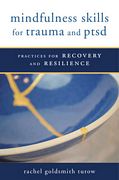
|
Mindfulness Skills for Trauma and PTSD: Practices for
Recovery and Resilience. Rachel Goldsmith Turow, $36.95
Trauma touches every life, but the way that we hold our
pain makes a difference. Mindfulness Skills for Trauma and PTSD provides
user-friendly descriptions of the many facets of traumatic stress alongside
evidence-based strategies to manage trauma symptoms and build new strengths.
This book is a valuable resource for trauma survivors, health professionals,
researchers, mindfulness practitioners, and others seeking new pathways to
recovery and resilience.
It is normal to feel anxious or depressed after trauma,
and to have upsetting thoughts and memories. Instead of fighting our feelings
and blaming ourselves for what are actually common responses to trauma,
mindfulness practices can help us tolerate and decrease distress, cultivate
kindness towards ourselves and others, make wise choices, navigate attention,
improve relationships, and relax—capacities that reduce trauma symptoms and
advance our overall well-being.
Practicing the small stuff can help us with the big
stuff. As we learn to notice our breathing, walking, minor frustrations or
daily activities with curiosity and care, we build inner resources to
skillfully handle past trauma, as well as current and future challenges.
Mindfulness practices can transform self-blame into self-respect and self-compassion.
We can also match specific mindfulness skills to particular trauma symptoms.
For example, “grounding” with the five senses can help us when we feel
overwhelmed or spaced out, and loving-kindness meditation can alleviate
self-criticism.
With this book, you will explore scientifically supported
mindfulness practices, plus “In their own words” sections that illustrate the
skills with personal stories demonstrating how mindfulness practices have
helped others recover from trauma. “Research highlight” sections showcase
fascinating scientific studies that form the basis for the book's approaches.
As we practice effective strategies to handle a full range of experiences, we
can each find new sources of hope, connection, and peace. |
Back to top
|
|
The Neurobiology of Attachment-Focused Therapy:
Enhancing Connection & Trust in the Treatment of Children & Adolescents. Jonathan Baylin & Daniel Hughes, $38.95
This groundbreaking book explores, for the first time,
how the attachment-focused family therapy model can respond to this question at
a neural level. It is a rich, accessible investigation of the brain science of
early childhood and developmental trauma. Each chapter offers clinicians new
insights — and powerful new methods — to help neglected and insecurely attached
children regain a sense of safety and security with caring adults. Throughout,
vibrant clinical vignettes drawn from the authors' own experience illustrate
how informed clinical processes can promote positive change. |
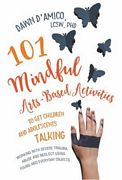
|
101 Mindful Arts-Based Activities to Get Children and
Adolescents Talking: Working with Severe Trauma, Abuse and Neglect Using Found
and Everyday Objects. Dawn D'Amico, $31.95
Many children who have experienced serious trauma are
withdrawn and closed off, making it difficult to engage with them in therapy
effectively. This book offers a compendium of therapeutic activities that will
help children who have endured painful abuse to open up, so that they can learn
to express their feelings and therapy can be directed towards their individual
needs. From useful techniques for bridging memory gaps to using masks for
self-expression, the innovative activities use mindfulness, art and play to
help children feel relaxed and responsive. The activities require very little
preparation, and use only everyday items that are easy to access and can be
used time and time again. Case studies throughout offer a helpful demonstration
of how the activities work in practice.
This is an ideal resource for use with children in
therapeutic, home and school settings. It is appropriate to use with children
aged 5-17 who have experienced trauma, physical abuse, sexual abuse, forced
migration and severe neglect, as well as those with acute depression, anxiety
and behavioural difficulties. |
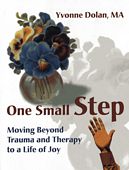
|
One Small Step: Moving Beyond Trauma and Therapy to a Life of Joy. Yvonne Dolan, $19.95
Yvonne Dolan believes that moving from victim to survivor is not enough. With compassion and respect, Dolan champions moving beyond a trauma-based identity, enabling trauma survivors to create a compelling and engaging life that is greater than the shadow of their traumatic experiences. |
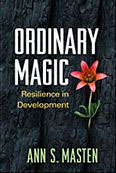
|
Ordinary Magic: Resilience in Development. Ann
Masten, $52.95
From a pioneering researcher, this book synthesizes the
best current knowledge on resilience in children and adolescents. Ann Masten
explores what allows certain individuals to thrive and adapt despite adverse
circumstances, such as poverty, chronic family problems, or exposure to trauma.
Coverage encompasses the neurobiology of resilience as well as the role of
major contexts of development: families, schools, and culture. Identifying key
protective factors in early childhood and beyond, Masten provides a cogent
framework for designing programs to promote resilience. Complex concepts are
carefully defined and illustrated with real-world examples. families, schools,
and culture. Identifying key protective factors in early childhood and beyond,
Masten provides a cogent framework for designing programs to promote
resilience. Complex concepts are carefully defined and illustrated with
real-world examples. |
Back to top
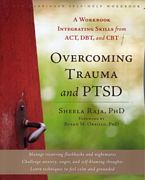
|
Overcoming Trauma and PTSD: a
Workbook Integrating Skills from ACT, DBT, and CBT. Sheila Raja, $24.95
Post-traumatic stress disorder affects
every sufferer in a different way. A veteran who committed atrocities during
war may not benefit from cognitive treatments in the same way a victim of
sexual assault might. For each type of trauma, there is an appropriate type of
treatment — and the best treatment may not lie entirely within one therapeutic
modality. Written by a psychologist who specializes in trauma, OVERCOMING TRAUMA AND PTSD combines the best of acceptance and
commitment therapy (ACT), dialectical behavior therapy (DBT), and cognitive
behavior therapy (CBT). By offering the best skills for specific symptoms,
readers get the quickest relief from flashbacks, insomnia, and other symptoms,
and the best chance of recovery. This workbook includes worksheets, checklists,
and exercises that focus on common elements underlying ACT, DBT, and CBT.
Readers practice emotional and situational exposure, behavioral change,
increasing interpersonal functioning, and mindfulness, and eventually use this
integrative approach to calm their symptoms and improve their quality of life. |
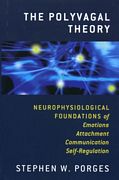
|
The Polyvagal
Theory: Neurophysiological Foundations of Emotions, Attachment,
Communication, and Self-regulation. Stephen Porges, $47.50
A collection of groundbreaking research by a leading figure in neuroscience. This book compiles, for the first time, Stephen Porges's decades of research. A leading expert in developmental psychophysiology and developmental behavioral neuroscience, Porges is the mind behind the groundbreaking Polyvagal Theory, which has startling implications for the treatment of anxiety, depression, trauma, and autism. Adopted by clinicians around the world, the Polyvagal Theory has provided exciting new insights into the way our autonomic nervous system unconsciously mediates social engagement, trust, and intimacy. |
|
|
Posttraumatic Play in Children: What Clinicians Need to
Know. Eliana Gil, $32.95
From leading expert Eliana Gil, this book provides child
clinicians with essential knowledge and tools for evaluating and working with
posttraumatic play. Such play, which is often repetitive and disturbing, may
help resolve traumatic experiences — but can also become toxic. The book guides
the clinician to determine what is going on with a given child and intervene sensitively
and effectively. Evocative case material is interwoven with up-to-date
information on the developmental impact of trauma and ways to facilitate
children's natural reparative capacities. A reproducible assessment checklist
to help clinicians differentiate between useful and dangerous posttraumatic
play can be downloaded and printed in a convenient 8½" x 11" size. |
Back to top
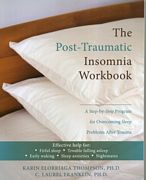
|
The Post-Traumatic Insomnia Workbook: a Step-by-Step Program for Overcoming Sleep Problems after Trauma. Karin Elorriaga Thompson & C. Laurel Franklin, $29.95
Difficult and traumatic life experiences affect our lives in unexpected ways and can even change the way we sleep. In fact, up to 75 percent of all people who have experienced abuse, violence, or traumatic incidents have sleeping problems after these events, even after all other trauma-related symptoms have diminished. If you've experienced these problems for yourself, The Post-Traumatic Insomnia Workbook is for you.
This workbook is based in cognitive behavioral therapy, a powerful approach that has been proven to be more effective over the long run than sleeping pills. Included are easy tips and techniques you can start doing right away to help you sleep better. You'll learn a variety of relaxation and sleep-scheduling skills that will help you put an end to broken sleep, the need to stay on high alert throughout the night, and sleep-sabotaging habits you may have developed. Why spend another night lying awake? Find the root cause of your restless nights and rediscover peaceful sleep. |

|
The Post-Traumatic Stress Disorder Sourcebook: a Guide to
Healing, Recovery and Growth, 2nd Edition. Glenn Schiraldi, $29.95
The Post-Traumatic Stress Disorder Sourcebook introduces
survivors, loved ones, and helpers to the remarkable range of treatment
alternatives and self-management techniques available today to break through
the pain and realize recovery and growth.
This updated edition incorporates all-new diagnostics
from the DSM-5 and covers the latest treatment techniques and research findings
surrounding the optimization of brain health and function, sleep disturbance,
new USDA dietary guidelines and the importance of antioxidants, early childhood
trauma, treating PTSD and alcoholism, the relationship between PTSD and brain
injury, suicide and PTSD, somatic complaints associated with PTSD, and more. |
Back to top
|
|
The PTSD Workbook: Simple, Effective Techniques for
Overcoming Traumatic Stress Symptoms, 3rd Edition. Mary Beth Williams &
Soili Poijula, $36.50
PTSD is an extremely debilitating condition that can
occur after exposure to a terrifying event. Your symptoms may be getting in the
way of you living your life. PTSD can often cause you to relive your traumatic
experience in the form of flashbacks, memories, nightmares, and frightening
thoughts. This is especially true when you are exposed to events or objects
that remind you of your trauma. Left untreated, PTSD can lead to emotional
numbness, insomnia, addiction, anxiety, depression, and even suicide. So, how
can you start to heal and get your life back?
In The PTSD Workbook, psychologists and trauma
experts Mary Beth Williams and Soili Poijula outline techniques and
interventions used by PTSD experts from around the world to conquer distressing
trauma-related symptoms. In this fully revised and updated workbook, you’ll
learn how to move past the trauma you’ve experienced and manage symptoms such
as insomnia, anxiety, and flashbacks.
Based in cognitive behavioral therapy (CBT), this book is
extremely accessible and easy to use, offering evidence-based therapy at a low
cost. This new edition features chapters focusing on veterans with PTSD, the
link between cortisol and adrenaline and its role in PTSD and overall mental
health, and the mind-body component of PTSD. Clinicians will also find
important updates reflecting the new DSM-V definition of PTSD. This book is
designed to give you the emotional resilience you need to get your life back
together after a traumatic event. |
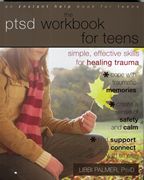
|
PTSD Workbook for Teens: Simple,
Effective Skills for Healing Trauma. Libbi Palmer,
$24.95
The PTSD WORKBOOK FOR TEENS incorporates
cognitive behavioral therapy (CBT), trauma-focused cognitive behavioral
therapy, and dialectical behavior therapy (DBT). This approach helps teens work
through their symptoms and make progress in overcoming them. Each worksheet and
activity encourages teen readers to reestablish a sense of safety, manage their
thoughts and feelings appropriately, remember and mourn their traumatic
experience, and reconnect with a positive sense of self. Written by a
psychologist specializing in trauma with over twenty years of experience, this
workbook will help thousands of teens take back their lives from traumatic
memories and PTSD-related symptoms. |
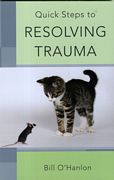
|
Quick Steps to Resolving Trauma. Bill O’Hanlon, $18.50
A friendly and brief guide to trauma resolution, Quick Steps to Resolving Trauma tackles a very difficult issue: trauma resolution. This book details a philosophy and methods of working briefly and effectively with traumatized clients. Simple examples and dialogue, whimsical illustrations, and O'Hanlon's classic reader-oriented approach make this book inviting to therapists and consumers alike. |
Back to top
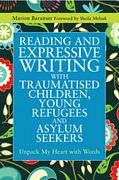
|
Reading and Expressive Writing with Traumatised
Children, Young Refugees, and Asylum Seekers: Unpack My Heart with Words. Marion
Baraitser, $45.95
This book explores how literature can be used to help
young victims cope with their experiences. The process of reading, discussing
and rewriting carefully selected texts can have a significant therapeutic
impact, as the young person identifies his or her own experience in the
narrative. This book guides readers through all aspects of implementing
biblio/narrative therapy with children and adolescents, from the importance of
cultural sensitivity and understanding the psychological needs of the child to
providing more practical information on how to choose the right text and
encourage expression through the spoken and written word. It includes exercises
for use in sessions, an analysis of the importance of symbol when working
therapeutically with children, and a complete account of the ethics of good
practice. Drawing on the author's innovative work with young asylum seekers and
refugees, and with an overview of the latest research in creativity, language
and memory, the book provides a comprehensive and practical resource on the use
of literature to help young victims regain their dignity and overcome the
overwhelmed hurt self.
This book will be of immeasurable value to students and
practitioners world-wide in arts and health care who work with traumatised
young people, including counsellors, clinical psychologists, educational
psychologists, teachers, psychotherapists and social workers. |
|
|
Real Life Heroes Life Storybook, 3rd Edition.
Richard Kagan, $41.90
Real Life Heroes Life Storybook, 3rd Edition is a
resourceful tool for children with traumatic stress. The resiliency-centered
format and structure of the volume is coupled with treatment and sessions
outlined in the Real Life Heroes Toolkit for Treating Traumatic Stress in
Children and Families. This updated edition uses a creative arts approach,
encouraging children to work with dependable adults to develop autobiographies
through a wide range of activities, including drawings, music, movies, and
narrative. By helping children feel protection from adversity and stressors
that exist in everyday life, this workbook gives children a sense of value that
can promote transformation of troubled children from victims into tomorrow's
heroes. |
|
Real Life Heroes Toolkit for Treating Traumatic Stress
in Children and Families, 2nd Edition. Richard Kagan, $89.45
Real Life Heroes: Toolkit for Treating Traumatic
Stress in Children and Families, Second Edition is an organized and
easy-to-use reference for practitioners providing therapy to children and
caregivers with traumatic stress. This step-by-step guide is an accompanying
text to the workbook Real Life Heroes: A Life Story Book for Children, Third
Edition and provides professionals with structured tools for helping
children to reintegrate painful memories and to foster healing from traumatic
experiences. The book is a go-to resource for practitioners in child and family
service agencies and treatment centers to implement trauma-informed,
resiliency-centered and evidence-supported services for children with traumatic
stress. |
Back to top
|
Rebuilding Attachments
with Traumatized Children: Healing from Losses, Violence, Abuse
and Neglect. Richard Kagan, $63.95
This therapeutic guide to helping troubled children looks at the impact
of loss, neglect and violence on children's development. In order
to move beyond these experiences children need to discover and foster
their strengths. Richard Kagan shows how to do this by building enduring
connections, trust and hope with children who are at risk of harming
themselves and others. Creative and relevant, Rebuilding Attachments
with Traumatized Children offers a practical blend of specific
interventions, current research, theory and compassionate experience. |
|
Rebuilding Shattered Lives: Treating Complex PTSD and Dissociative Disorders, 2nd Edition. James Chu, $61.00
Children, adolescents, and adults who experience "developmentally adverse interpersonal trauma are at risk not only for posttraumatic stress disorder (PTSD) but also for other anxiety, affective, addictive, conduct, eating, psychotic personality disorders, as well as for re-traumatization. This book describes the theoretical constructs of how complex trauma-related clinical syndromes evolve and present in adult patients, integrating theories concerning posttraumatic stress disorder, dissociation and personality development. This book is an authoritative clinical guide to the treatment of patients with complex posttraumatic and dissociative disorders. |
|
Reconciliation: Healing the Inner Child. Thich Nhat Hanh, $14.95
Zen Master Thich Nhat Hanh offers insights on how mindfulness practice can help heal childhood suffering and trauma. With practical techniques for transforming anger, sadness and fear, Thich Nhat Hanh shows how we can bring reconciliation within and allow joy and tranquility to flourish. |
Back to top
|
Reframing PTSD as Traumatic Grief: How Caregivers Can
Companion Traumatized Grievers through Catch-Up Mourning. Alan Wolfelt,
$35.95
No matter the cause, PTSD results in symptoms of acute
stress, including anxiety, persistent thoughts or flashbacks, and a host of
other physical, emotional, cognitive, social, and spiritual challenges. In this
guide for counselors and caregivers, Dr. Alan Wolfelt reframes PTSD as a form
of grief. Helping PTSD sufferers mourn their unacknowledged and “carried” grief
over the traumatic events that caused their symptoms is the key to helping them
heal. Rather than seeking to quickly treat away symptoms of PTSD, caregivers
who follow Dr. Wolfelt’s “companioning” philosophy will instead see the natural
and necessary PTSD symptoms as indications that the sufferer needs additional
support and encouragement to express himself. This holistic new approach
acknowledges clinical PTSD treatments as part of the solution while emphasizing
that authentic mourning is the primary and most essential healer. |
|
Rhythms of Relating in Children's Therapies: Connecting
Creatively with Vulnerable Children. Edited by Stuart Daniel & Colwyn Trevarthen,
$49.95
This multidisciplinary book shows how to foster
meaningful relationships between therapists and vulnerable children, through
exploring the concept of communicative musicality and creating rhythms of
connection.
It includes broad and in-depth contributions from leading
therapists from diverse backgrounds — including Peter Levine, Daniel Hughes,
Stephen Porges, Dennis McCarthy and many more. Contributors reflect on their
own experiences, providing insights from the fields of music therapy, trauma,
dance and movement therapy, psychobiology, dramatherapy, counselling, play
therapy, and education. Contemporary theory is woven in with case stories to
highlight the emotional realities of working with highly vulnerable children,
and to present proven examples of how therapists can improve the quality of
connectedness. Full of original and innovative ideas for working with
attachment issues, trauma, communication difficulties, autism, learning
disabilities, aggression and anxiety, this is inspiring reading for
professionals who work with vulnerable children in creative therapies. |
|
A Safe Place for Caleb: an Interactive Book for Kids,
Teens and Adults with Issues of Attachment, Grief and Loss or Early Trauma.
Kathleen Chara & Paul Chara, $24.95
A Safe Place for Caleb is a comprehensive and
richly illustrated resource for individuals of all ages who are dealing with
attachment problems. Parents, professionals, and lay people will find this book
helpful in understanding and addressing attachment disorders in children,
adolescents, and adults.
The first half of the book is an interactive story that
follows the experiences of Caleb, a young boy who relates his difficulties and
frustrations in forming and sustaining healthy relationships... The second half
of the book presents a summary of current scientific thought on attachment
styles and disorders, and provides a wide array of assessment tools, photocopy
material and healing techniques to address attachment difficulties. Based on
established psychological principles, the book is a unique and imaginative
guide for professionals, parents, caregivers, and people of all ages who are
dealing with attachment issues. |
Back to top
|
Scared Sick: the Role of Childhood
Trauma in Adult Disease. Robin Karr-Morse, with
Meredith Wiley, $31.50
The first years of human life are more
important than we ever realized. In SCARED SICK, family therapist Robin
Karr-Morse connects psychology, neurobiology, endocrinology, immunology, and
genetics to demonstrate how chronic fear in infancy and early childhood — when
we are most helpless — lies at the root of common diseases in adulthood. Highlighting
case studies and cutting-edge scientific findings, Karr- Morse shows how our
innate fight-or-flight system can injure us if overworked in the early stages
of life. Persistent stress can set the stage for diabetes, heart disease,
obesity, depression, and addiction later in life. |
|
A Short Introduction to Attachment and Attachment Disorder,
2nd Edition. Colby Pearce, $25.95
Concise and easy-to-understand, this book provides an
introduction to what attachment means and how to recognise attachment disorder
in children. Colby Pearce explains how complex problems in childhood may stem
from the parent-child relationship during a child's early formative years, and
later from the child's engagement with the broader social world. The book
explores the mind-set of difficult and traumatised children and the motivations
behind their complex tendencies and behaviours. It goes on to offer a
comprehensive set of tried-and-tested practical strategies that can be used
with children affected by an attachment disorder. This second edition has been
updated to include the new DSM-5 diagnostic criteria for Reactive Attachment
Disorder and an increased number of illustrative case vignettes.
This is a perfect introduction to the subject for
parents, carers and practitioners in supportive roles caring for children. |
|
The Simple Guide to Child Trauma: What It Is and How
to Help. Betsy de Thierry, $15.95
What is trauma? How does it affect children? How can
adults help?
Providing straightforward answers to these complex
questions, The Simple Guide to Child Trauma is the perfect starting
point for any adult caring for or working with a child who has experienced
trauma. It will help them to understand more about a child's emotional and
behavioural responses following trauma and provides welcome strategies to aid
recovery. Reassuring advice will also rejuvenate adults' abilities to face the
challenges of supporting children. |
Back to top
|
Strengthening Family Coping Resources: Interventions
for Families Impacted by Trauma. Laurel Kiser, $53.95
Strengthening Family Coping Resources (SFCR)
uses a skill-building, multi-family group framework to teach constructive
resources to families who have a high exposure to stress and trauma. As an
intervention for high-risk families, SFCR can cause a reduction in symptoms of
traumatic distress and behavior problems and help families demonstrate higher
functioning. The SFCR manual is based on a systemic, family approach and uses
empirically-supported trauma treatment that focuses on family ritual, storytelling,
and narration, which improves communication and understanding within family
members.
Strengthening Family Coping Resources will
help you reduce the symptoms of traumatic stress disorders and increase coping
resources in children, adult caregivers, and the family system. It also
provides a novel approach to addressing co-occurring traumatic reactions in
multiple family members by including developmentally appropriate skill-building
activities that are reinforced with family practice. For anyone working with
families in a therapeutic capacity, this manual is a must-have resource. |
|
Supporting Traumatized
Children and Teenagers: a Guide to Providing Understanding and Help. Atle Dyregrov, $34.95
Trauma can result from a range of experiences from bullying to witnessing violence to living through war. Supporting Traumatized Children and Teenagers is an accessible, comprehensive book providing an overview of the impact of trauma on children and adolescents and how they can be supported following trauma.
Variables affecting the impact of trauma are explored such as different developmental stages, gender, the reactions of friends and parents, the child's personality, and their caring environment. Appropriate and effective ways of helping children after a traumatic event are outlined, and different types of therapy, such as group therapy and cognitive behavioural therapy, are discussed. The book offers case examples and practical tips throughout, and includes a chapter on how someone working with a traumatized child can help and look after themselves. |
Back to top
|
A Terrible Thing
Happened: a Story for Children Who Have Witnessed Violence or Trauma. Margaret Holmes, Illustrated by Cary Pillo, $13.50
Sherman Smith saw the most terrible thing happen.
At first he tried to forget about it, but soon something inside
him started to bother him. He felt nervous for no reason. Sometimes
his stomach hurt. He had bad dreams. And he started to feel angry
and do mean things, which got him in trouble. Then he met Ms. Maple,
who helped him talk about the terrible thing that he had tried to
forget. Now Sherman is feeling much better.
This gently told and tenderly illustrated story is for children
who have witnessed any kind of violent or traumatic episode, including
physical abuse, school or gang violence, accidents, homicide, suicide,
and natural disasters such as floods or fire.
An afterword by Sasha J. Mudlaff written
for parents and other caregivers offers extensive suggestions for
helping traumatized children, including a list of other sources
that focus on specific events. |
|
Therapy with Infants: Treating a Traumatised Child.
Inger Thormann & Inger Poulsen, $56.95
When a child without fully developed language experiences
physical or psychological stress that exceeds the child's capacity to cope, the
experience can leave lasting marks. Infant Therapy, inspired by the work of the
French pediatrician and psychoanalyst Francoise Dolto and her student Caroline
Eliacheff, offers treatment for these early traumas.
The method developed by the book's authors can be applied
both with infants and with older children. While Infant Therapy is primarily a
therapeutic intervention aimed at traumatized infants, the method can also be
applied in daily educational practices by preschool teachers, nurses, teachers,
day care providers and parents.
Respectful, compassionate, and innovative, this book
offers a deeply healing experience for traumatized infants and children. |
|
Trauma and the Avoidant Client: Attachment-Based
Strategies for Healing. Robert Muller, $32.95
How to effectively engage traumatized clients, who avoid
attachment, closeness, and painful feelings.
A large segment of the therapy population consist of
those who are in denial or retreat from their traumatic experiences. Here,
drawing on attachment-based research, the author provides clinical techniques,
specific intervention strategies, and practical advice for successfully
addressing the often intractable issues of trauma. Trauma and the Avoidant
Client will enhance the skills of all mental health practitioners and
trauma workers, and will serve as a valuable, useful resource to facilitate
change and progress in psychotherapy. |
Back to top
|
Trauma,
Brain, and Relationship: Helping Children Heal. Bruce
Perry, Daniel Siegel, $49.95 DVD 30 minutes
This 30 minute documentary features
Bryan Post, Bruce Perry, Daniel Siegel, Marti Glenn, and other
renowned experts in the field of childhood trauma, attachment
and bonding. This is a great way to share the new understanding
of how trauma effects the development of the mind body system,
and the long-term effects on children's behavior and social-emotional
relationships. |
|
Trauma Essentials: the Go-to-Guide. Babette Rothschild, $23.00
Victims of traumatic events seek treatment for their often debilitating symptoms. Here, a leading trauma specialist presents the wide range of trauma treatments available and gives readers tools to choose a treatment plan or assess whether their treatment plan is working. Medications and associated conditions such as anxiety and panic disorders are also discussed. This book presents the most necessary and relevant information in a compact and accessible format, serving both as a review for therapists and a straightforward, easy-to-use guide for patients. Topics covered include definitions and symptoms, accepted treatments, physiological explanations, and treatment evaluation strategies, all written in a practical and accessible style. |
|
Trauma is Really Strange. Steve Haines, $15.95
When something traumatic happens to us, we dissociate and
our bodies shut down their normal processes. This unique comic explains the
strange nature of trauma and how it confuses the brain and affects the body.
With wonderful artwork, cat and mouse metaphors, essential scientific facts,
and a healthy dose of wit, the narrator reveals how trauma resolution involves
changing the body's physiology and describes techniques that can achieve this,
including Trauma Releasing Exercises that allow the body to shake away tension,
safely releasing deep muscular patterns of stress and trauma. |
|
The Trauma Recovery
Group: a Guide for Practitioners. Michaela Mendelsohn,
Judith Lewis Herman, Emily Schatzow, Melissa Coco, Diya Kallivayalil
& Jocelyn Levitan, $49.95
Rich with expert, practical guidance for therapists, this book presents an evidence-based group treatment approach for survivors of interpersonal trauma. This time-limited treatment is designed for clients who have achieved basic safety and stability in present-day life and who are ready to work on the more enduring ways that trauma has harmed their self-perception and relationships. Case examples and transcripts illustrate the process of screening, selecting, and orienting group members and helping them craft and work toward individualized goals, while optimizing the healing power of group interactions. In a convenient large-size format, the book includes reproducible handouts, worksheets, and flyers. |
Back to top
|
Trauma Systems Therapy for Children and Teens, 2nd
Edition. Glenn Saxe, B. Heidi Ellis & Adam Brown, $62.95
This highly practical book has helped thousands of
clinicians make the most of limited resources to support children and families
struggling with chronic, multiple adversities. Trauma systems therapy (TST) is
grounded in cutting-edge research on traumatic stress and child development. It
provides a roadmap for integrating individualized treatment with services at
the home, school, and community levels. Effective assessment and intervention
strategies are accompanied by vivid case material and reproducible worksheets
and forms. |
|
Trauma Through
a Child’s Eyes: Awakening the Ordinary Miracle of Healing,
Infancy through Adolescence. Peter Levine & Maggie
Kline, $32.00
An essential guide for recognizing, preventing,
and healing childhood trauma, from infancy through adolescence — what
parents, educators, and health professionals can do. |
|
The Trauma Treatment Handbook: Protocols Across the Spectrum. Robin Shapiro, $41.00
With so many trauma treatments to choose from, how can a therapist know which is best for his or her client? In a single, accessible volume, Robin Shapiro explains them all, making sense of the treatment options available, their advantages and disadvantages, and how to determine which treatments are best suited to which clients. |
|
Trauma-Focused CBT for Children and Adolescents:
Treatment Applications. Edited by Judith Cohen, Anthony Mannarino &
Esther Deblinger, $36.95
Featuring a wealth of clinical examples, this book facilitates
implementation of trauma-focused cognitive-behavioral therapy (TF-CBT) in a
range of contexts. It demonstrates how assessment strategies and treatment
components can be tailored to optimally serve clients' needs while maintaining
overall fidelity to the TF-CBT model. Coverage includes ways to overcome
barriers to implementation in residential settings, foster placements, and
low-resource countries. Contributors also describe how to use play to
creatively engage kids of different ages, and present TF-CBT applications for
adolescents with complex trauma, children with developmental challenges,
military families struggling with the stresses of deployment, and Latino and
Native American children. |
Back to top
|
Trauma-Informed Practices
with Children and Adolescents. William Steele & Cathy Malchiodi,
$68.50
TRAUMA-INFORMED PRACTICES WITH CHILDREN
AND ADOLESCENTS is a sourcebook of practical approaches to working with
children and adolescents that synthesizes research from leading trauma
specialists and translates it into easy-to-implement techniques.
The book addresses the sensory and
somatic experiences of trauma within structured formats that meet the
"best practices" criteria for trauma-informed care: safety,
self-regulation, trauma integration, healthy relationships, and healthy
environments. Each chapter contains short excerpts, case examples, and
commentary relevant to the chapter topic from recognized leaders in the field
of trauma intervention with children and adolescents. In addition to this,
readers will find chapters filled with easily applied activities, methods, and
approaches to assessment, self-regulation, trauma integration, and
resilience-building. The book's structured yet comprehensive approach provides
professionals with the resources they need to help trauma victims not just
survive but thrive and move from victim thinking to survivor thinking using the
current best practices in the field. |
|
Traumatic
Experience and the Brain: a Handbook for Understanding and Treating
Those Traumatized as Children. Dave Ziegler, $26.95
Traumatic Experience and the Brain is the result of Dr. Dave Ziegler's three decades of experience
with children traumatized by abuse and/or neglect. This book details
the effect of such trauma on the developing brain, describing how
it actually rewires one's perceptions of self, others, and the world.
It is a book of hope for foster, natural, and adoptive parents of
such "broken" children and the therapists, teachers and
social workers who attempt to help them. |
|
Treating Chronically Traumatized Children: Don't Let
Sleeping Dogs Lie. Arianne Striuk, $70.95
Struik has developed a method for those cases labelled
most difficult to treat, involving deregulated, traumatized children who refuse
to talk about their memories, or claim to have ‘forgotten’ them completely.
In Treating Chronically Traumatized Children, Arianne Struik
presents the case for waking those ‘sleeping dogs’ in a safe and structured
environment, in order to allow the healing process to begin and prevent trauma
later in life.
Illustrated throughout by case studies and comprehensive
explanation of the theory and the treatment method, Treating
Chronically Traumatized Children is clear and accessible and is ideal
for psychologists, psychiatrists, psychotherapists and counsellors, as well as
parents and anyone working with chronically traumatized children and
adolescents. |
Back to top
|
Treating
Complex Traumatic Stress Disorders: an Evidence-Based Guide. Edited
by Christine Courtois & Julian Ford, $60.65
Chronic childhood trauma, such as
prolonged abuse or family violence, can severely disrupt a
person's development, basic sense of self and later relationships.
Adults with this type of history often come to therapy with
complex symptoms that go beyond existing criteria for PTSD.
This important book brings together prominent authorities to
present the latest thinking on complex traumatic stress disorders
and provide practical guidelines for conceptualization and
treatment. Evidence-based assessment procedures are detailed
and innovative individual, couple, family, and group therapies
are described and illustrated with case vignettes and session
transcripts. |
|
Treating Co-occurring Adolescent PTSD and Addiction: Mindfulness-Based
Cognitive Therapy for Adolescents with Trauma and Substance-Abuse Disorders. Lisa
Fortuna, Zayda Vallejo, Florence Meleo-Meyer, $69.95
Trauma and addiction often present side by side. Based in
cognitive behavioral therapy (CBT) and mindfulness, Treating Co-occurring
Adolescent PTSD and Addiction is essential for anyone working with
adolescents with addiction and post-traumatic stress disorder (PTSD).
Developed and researched explicitly for dual diagnosis
adolescent clients, this book provides a range of mindfulness practices and
tools to help your client be present in what he or she is experiencing-instead
of slipping into a pattern of avoidance. In addition, the cognitive behavioral
strategies can help adolescents who are at risk of recurrent trauma, and who
could therefore benefit from practicing coping strategies to assist them in
their current daily situations.
This is a must-have resource for any mental health provider
treating adolescents with dual diagnosis of PTSD and addiction. |
|
Treating PTSD in Preschoolers: a Clinical Guide. Michael
Scheeringa, $48.50
Adapting cognitive-behavioral therapy (CBT) to meet the
needs of 3- to 6-year-olds with post-traumatic stress disorder (PTSD), this
book provides an evidence-based framework for assessment and treatment.
Step-by-step instructions are provided for conducting graduated exposure in a
safe, developmentally appropriate fashion. Case examples and sample dialogues
illustrate how to implement each component of therapy, engage both children and
parents, and motivate them to complete treatment successfully. The treatment is
suitable for children exposed to any type of trauma. In a large-size format for
easy photocopying, the book contains dozens of reproducible handouts and
forms. Purchasers get access to a Web page where they can download and print
the reproducible materials. |
Back to top
|
Treating Trauma in Adolescents: Development,
Attachment, and the Therapeutic Relationship. Martha Straus, $49.50
This book presents an innovative and empathic approach to
working with traumatized teens. It offers strategies for getting through to
high-risk adolescents and for building a strong attachment relationship that
can help get development back on track. Martha Straus draws on extensive
clinical experience as well as cutting-edge research on attachment, developmental
trauma, and interpersonal neurobiology. Vivid case material shows how to engage
challenging or reluctant clients, implement interventions that foster
self-regulation and an integrated sense of identity, and tap into both the
teen's and the therapist's moment-to-moment emotional experience. Essential
topics include ways to involve parents and other caregivers in treatment. |
|
Treating Trauma and Traumatic Grief in Children and
Adolescents, 2nd Edition. Judith Cohen, Anthony Mannarino & Esther
Deblinger, $59.95
This authoritative guide has introduced many tens of
thousands of clinicians to Trauma-Focused Cognitive-Behavioral Therapy
(TF-CBT), a leading evidence-based treatment for traumatized children and their
parents or caregivers. Preeminent clinical researchers provide a comprehensive
framework for assessing posttraumatic stress disorder (PTSD), other
trauma-related symptoms, and traumatic grief in 3- to 18-year-olds; building
core coping skills; and directly addressing and making meaning of children's
trauma experiences. Implementation is facilitated by sample scripts, case
examples, troubleshooting tips, and reproducible client handouts. New to this edition:
- Incorporates a decade's worth of advances in TF-CBT research and
clinical practice
- Updated for DSM-5
- Chapter on the model's growing evidence base
- Chapter on group applications
- Expanded coverage of complex trauma, including ways to adapt
TF-CBT for children with severe behavioral or affective dys=regulation
|
|
Treating Traumatic Bereavement: a Practitioner's
Guide. Laurie Anne Pearlman, et al, $53.50
This book presents an integrated treatment approach for
those struggling to adapt after the sudden, traumatic death of a loved one. The
authors weave together evidence-based clinical strategies grounded in
cutting-edge knowledge about both trauma and grief. The book offers a clear
framework and many practical tools for building survivors'
psychological and interpersonal resources, processing their trauma, and
facilitating mourning. In a large-size format with lay-flat binding for easy
photocopying, the book includes over 30 reproducible handouts. Purchasers can
access a companion website to download and print these materials as well as
supplemental handouts and a sample 25-session treatment plan. |
Back to top
|
Treating Traumatic
Stress in Children and Adolescents: How to Foster Resilience through
Attachment, Self-Regulation and Competency. Margaret Blaustein
& Kristine Kinniburgh, $52.95
Grounded in theory and research on complex childhood trauma, this book provides an accessible, flexible, and comprehensive framework for intervention with children and adolescents and their caregivers. It is packed with practical clinical tools that are applicable in a range of settings, from outpatient treatment centers to residential programs. Rather than presenting a one-size-fits-all treatment model, the authors show how to plan and organize individualized interventions that promote resilience, strengthen child-caregiver relationships, and restore developmental competencies derailed by chronic, multiple stressors. |
|
Treating Traumatized Children: a Casebook of
Evidence-Based Therapies. Edited by Brian
Allen & Mindy Kronenberg, $35.50
Featuring extensive case studies, this volume provides a
unique window into implementation of evidence-based treatments in real-world
community settings. Experienced therapists illustrate the use of three
effective therapies for traumatized children and their caregivers:
trauma-focused cognitive-behavioral therapy (TF-CBT), child-parent
psychotherapy (CPP), and parent-child interaction therapy (PCIT). Covering the
entire process of assessment and intervention, the cases highlight ways to
maintain treatment fidelity while addressing complex clinical challenges with
diverse clients. Experts in the respective therapy models offer instructive
commentaries at the end of each case. The book also provides a concise
introduction to each model, including its theoretical underpinnings, empirical
support, and applications. |

|
Understanding Disorganized Attachment: Theory and Practice for Working with Children and Adults. David Shemmings & Yvonne Shemmings, $35.95
Disorganized attachment, the most extreme form of insecure attachment, can develop in a child when the person who is normally meant to protect them is a source of danger. This usually leads to 'fear without solution' and the effects can be lasting and damaging.
This book is a comprehensive and accessible text on disorganized attachment. It outlines what it is, how it can be identified and the key causes, including neurological, biochemical and genetic explanations. Factors that contribute to disorganized attachment are covered including unresolved loss and trauma, and the behaviour of caregivers. The authors also discuss evidence-based interventions to help families and carers as well as how to work with adults to prevent or minimize its occurrence. To root the theory in practice and to illustrate real-life examples of disorganized attachment case vignettes are included. |
Back to top
|
What Doesn’t Kill Us: the New
Psychology of Posttraumatic Growth. Stephen Joseph,
$19.99
For the past
twenty years, pioneering psychologist Stephen Joseph has worked with survivors
of trauma. His studies have yielded a startling discovery: that a wide range of
traumatic events — from illness, divorce, separation, assault, and bereavement to
accidents, natural disasters, and terrorism — can act as catalysts for positive
change. Boldly challenging the conventional wisdom about trauma and its
aftermath, Joseph demonstrates that rather than ruining one’s life, a traumatic
event can actually improve it. Drawing on the wisdom of ancient philosophers,
the insights of evolutionary biologists, and the optimism of positive
psychologists, WHAT DOESN’T KILL
US reveals how all of us can
navigate change and adversity — traumatic or otherwise — to find new meaning,
purpose, and direction in life. |
|
When Someone You Love Suffers from Posttraumatic Stress: What to Expect and What You Can Do. Claudia Zayfert & Jason DeViva, $17.95
For trauma survivors struggling with intense memories and emotions, it often feels like life won't ever be "normal" again. Effective treatments are out there, but the needs of family members are often overlooked. Will the person you love ever get better? What can you do to promote healing? Where can you turn when you just can't cope? This compassionate guide is packed with information, support, vivid stories, and specific advice. Learn to navigate the rough spots day by day and help your loved one find a brighter tomorrow. |
|
When Something Terrible Happens: Children Can Learn to
Cope with Grief. Marge Heegaard, $12.95
Activities to help children explore the fright,
confusion, and insecurity caused by traumatic events in their lives. |
Back to top
|
Why Me? A Programme for Children and Young People Who Have Experienced Victimization. Shellie Keen, Tracey Lott & Pete Wallis, $52.95
Why Me? is a programme designed to help children and young people recover from the experience of victimization, through exercises, activities and a DVD. The activities explore the young person's feelings, their needs, and their personal strengths and encourage them to think about their support network. The book also includes guidance for adults working with young people and case examples that demonstrate how best to use the programme. The DVD contains real-life stories of young people who have been victimized and supports the exercises in the book.
Why Me? is an essential resource for any adult who may encounter a child or young person who has been victimized, including social workers, youth workers, teachers, police, education welfare officers and victim support and witness service workers. |
|
Why Are You So Scared?
A Child's Book about Parents with PTSD. Beth Andrews, $10.95
(ages 4-8)
When a parent has PTSD, children can
feel confused, scared or helpless. WHY ARE YOU SO SCARED explains PTSD and its
symptoms in kid-friendly language and encourages kids to express their thoughts
and feelings. |
|
Working with Children
to Heal Interpersonal Trauma: the Power of Play. Edited by Eliana
Gil, $45.50
Featuring in-depth case presentations from master clinicians, this volume highlights the remarkable capacity of traumatized children to guide their own healing process. The book describes what posttraumatic play looks like and how it can foster resilience and coping. Demonstrated are applications of play, art, and other expressive therapies with children who have faced such overwhelming experiences as sexual abuse or chronic neglect. The contributors discuss ways to facilitate forms of expression that promote mastery and growth, as well as how to intervene when play becomes stuck in destructive patterns. They share effective strategies for engaging hard-to-reach children and building trusting therapeutic relationships. |
Back to top
|
Working with Grieving and Traumatized
Children and Adolescents: Discovering What Matters Most through Evidence-Based,
Sensory Interventions. William Steele & Caelen
Kuban, $44.00
WORKING WITH GRIEVING AND TRAUMATIZED
CHILDREN AND ADOLESCENTS features the Structured Sensory Interventions for
Traumatized Children, Adolescents and Parents (SITCAP) intervention model,
proven in successfully addressing violent situations such as murder, domestic
violence, and physical abuse, as well as non-violent grief- and trauma-inducing
situations including divorce, critical injuries, car fatalities, terminal
illness, and environmental disasters.
Filled with practical and proven
activities for use with children and adolescents experiencing trauma and grief,
this resource is based on the authors' experience working with all types of
traumatic events in school, agency, and community-based programs. |
|
Yoga for Emotional Trauma: Meditations
and Practices for Healing Pain and Suffering. Mary
NurrieStearns & Rick NurrieStearns, $25.50
In YOGA FOR EMOTIONAL TRAUMA, a
psychotherapist and a meditation teacher present a yogic approach to emotional
trauma by instructing you to apply mindful awareness, breathing, yoga postures,
and mantras to their emotional and physical pain. In the book, you’ll learn why
yoga is so effective for dealing with emotional trauma. Drawing upon practices
and philosophy from eastern wisdom traditions, and texts, this book will take
you on a journey into wholeness, one that embraces body, mind and spirit.
Inside, you will discover the lasting effect that trauma has on physiology and
how yoga resets the nervous system. Combining yogic principles, gentle yoga
postures, and mindfulness practices, this book filled with sustenance and
practical support that will move you along your own healing path. |
|
Young Children and Trauma: Intervention and Treatment.
Edited by Joy Osofsky, Foreword by Kyle D. Pruett, $34.50
Recent years have seen significant advances
in knowledge about the effects of exposure to psychological trauma
on young children from birth to age five. This volume brings together
leading experts to address practical considerations in working with
traumatized young children and their caregivers. State-of-the-art
assessment and treatment approaches are presented, together with
innovative service delivery models. With a focus on building cross-disciplinary
collaboration to better serve this vulnerable population, this is
an indispensable resource for all mental health and human service
professionals working with children at risk. In a new preface to
the paperback edition, editor Joy D. Osofsky reflects on critical
lessons learned in the aftermath of Hurricane Katrina. |
Back to top
Complete
Booklist
Resources for Families and Professionals
Adopting a Child with a Trauma &
Attachment Disruption History. Theresa Fraser,
$9.95
After the Crisis: Using Storybooks to Help Children Cope. Cathy Grace & Elizabeth Shores, $12.50
After the Storm: Healing after Trauma, Tragedy and Terror. Kendall Johnson, $19.50
Attachment in Common Sense and
Doodles: a Practical Guide. Miriam Silver, $22.95
The Attachment Therapy Companion: Key
Practices for Treating Children & Families. Arthur
Becker-Weidman, Lois Ehrmann & Denise LeBow, $29.50
Attachment, Trauma, and Healing: Understanding and
Treating Attachment Disorder in Children, Families, and Adults, 2nd Edition.
Terry Levy & Michael Orlans, $49.95
Attachment-Focused
Parenting: Effective Strategies to Care for Children. Daniel
Hughes, $42.00
Becoming an Adoption-Friendly School: a Whole-School
Resource for Supporting Children Who Have Experienced Trauma or Loss. Emma
Gore Langton & Katherine Boy, $45.95
The Body Keeps the Score: Brain, Mind, and Body in the
Healing of Trauma. Bessel Van Der Kolk, $24.95
The Body Remembers: the Psychophysiology of Trauma and Trauma Treatment. Babette Rothschild, $33.00
The Boy Who Built a Wall Around Himself. Ali
Redford, ilustrated by Kara Simpson, $17.95
The Boy Who Was Raised as a Dog and Other Stories from
a Child Psychiatrist's Notebook: What Traumatized Children Can Teach Us About
Loss, Love, and Healing, Revised Edition. Bruce Perry & Maia
Szalavitz, $22.49
Caleb's Healing Story: an Interactive Story with
Activities to Help Children to Overcome Challenges Arising from Trauma,
Attachment Issues, Adoption or Fostering. Kathleen Chara & Tasha
Lehner, illustrated by Samantha Aburime, $22.95
Child Abuse Trauma: Theory and Treatment of the Lasting Effects. John Briere, $63.95
Child Maltreatment: an Introduction, 3rd Edition.
Cindy Miller-Perrin & Robin Perrin, $133.95
The Child Survivor: Healing Developmental Trauma and Dissociation.
Joyanna Silberg, $43.95
Child Trauma Handbook: a Guide for Helping Trauma-Exposed Children and Adolescents. Ricky Greenwald, $55.50
Children and Adolescents in Trauma: Creative Therapeutic
Approaches. Chris Nicholson, Michael Irwin & Kedar Nath Dwivedi, $40.95
Children Exposed to Violence. Edited by Margaret M. Feerick & Gerald Silverman, $53.95
Children and Trauma: a Guide for Parents and Professionals. Cynthia Monahon, $25.99
Clinical Exercises for Treating
Traumatic Stress in Children and Adolescents: Practical Guidance and
Ready-To-Use Resources. Damion Grasso, $49.95
A Clinical Handbook/Practical Therapist Manual for Assessing and Treating Adults with Post-Traumatic Stress Disorder. Donald Meichenbaum, $77.50
Clinical Work with Traumatized Young Children. Edited by
Joy Osofsky, $57.50
Cognitive-Behavioral Therapies for Trauma, 2nd Edition.
Edited by Victoria Follette & Josef Ruzek, $70.50
Coping with Trauma-Related Dissociation: Skills Training for Patients and Therapists. Suzette Boon, Kathy Steele & Onno van der Hart, $40.50
Cory Helps Kids Cope with Sexual Abuse: Playful
Activities for Traumatized Children. Liana Lowenstein, $19.95
Counselling Skills for Working with
Trauma: Healing from Child Sexual Abuse, Sexual Violence, and Domestic Abuse. Christiane Sanderson, $33.95
Courage After Fire for Parents of
Service Members: Strategies for Coping When Your Son or Daughter Returns from
Deployment. Paula Domenici, Suzanne Best &
Keith Armstrong, $19.95
Creating Capacity for Attachment: Dyadic Developmental Psychotherapy in the Treatment of Trauma-Attachment Disorders. Arthur Becker-Weidman & Deborah Shell, $35.95
Creating Inclusion and Well-Being for Marginalized
Students: Whole-School Approaches to Supporting Children's Grief, Loss, and
Trauma. Edited by Linda Goldman, $45.95
Creating Loving Attachments: Parenting with PACE to Nurture
Confidence and Security in the Troubled Child. Daniel Hughes & Kim
Golding, $33.95
Creative Interventions with Traumatized Children, 2nd
Edition. Edited by Cathy Malchiodi
The Crisis Counseling and Traumatic Events Treatment Planner.
Arthur Jongsma, et al, (eds.) $46.95
Cyril Squirrel Finds Out about Love. Jane Evans,
illustrated by Izzy Bean, $19.95
Dancing In the Rain. Nadha Hassen, $18.50
Back to top
Dialogues with Forgotten Voices: Relational Perspectives on Child Abuse Trauma and Treatment of Dissociative Disorders. Harvey Schwartz, $73.00
Does My Child Have PTSD? What to Do When Your Child Is
Hurting from the Inside Out. Jolene Philo, $22.95
8 Keys to Safe Trauma Recovery: Take Charge Strategies
to Empower Your Healing. Babette Rothschild, $21.00
EMDR Therapy and Adjunct Approaches
with Children: Complex Trauma, Attachment, and Dissociation. Ana Gomez, $60.50
Emotional and Physical Trauma and Its Impact on
Breastfeeding Mothers: Clinics in Human Lactation, Volume 14. Dianne
Cassidy, $20.95
The Emotionally Abused and Neglected Child: Identification, Assessment and Intervention: a Practice Handbook, 2nd Edition. Dorota Iwaniec $71.99
Emotionally Focused Couple Therapy with Trauma Survivors: Strengthening Attachment Bonds. S. Johnson, $48.95
Empathic Care for Children with
Disorganized Attachments: a Model for Mentalizing, Attachment and
Trauma-Informed Care. Chris Taylor, $33.95
Empowering Children through Art and Expression: Culturally Sensitive Ways of Healing Trauma and Grief. Bruce St. Thomas & Paul Johnson, $29.95
Eye Movement Desensitization and Reprocessing: Basic Principles,
Protocols, and Procedures. Francine Shapiro, $64.95
Gentling: a Practical Guide to Treating PTSD in Abused
Children, 2nd Edition. William Krill, $26.95
Getting Past Your Past: Take Control of Your Life
with Self-Help Techniques from EMDR Therapy.
Francine Shapiro, $18.99
Grief and Trauma in Children: an Evidence-Based
Treatment Manual. Alison Salloum, $53.95
Healing Child Trauma through Restorative Parenting.
Chris Robinson & Terry Philpot, $33.99
Healing Developmental Trauma: How Early Trauma
Affects Self-Regulation, Self-Image, and the Capacity for Relationship. Laurence Heller & Aline LaPierre, $25.95
The Healing Forest in Post-Crisis
Work with Children: a Nature Therapy and Expressive Arts Program for Groups. Ronen Berger & Mooli Lahad, $33.95
Healing from Post-Traumatic Stress: a Workbook for Recovery. Monique Lang, $23.95
Healing the Hidden Hurts: Transforming Attachment and
Trauma Theory into Effective Practice with Families, Children, and Adults. Edited
by Caroline Archer, Charlotte Drury & Jude Hills, $35.95
The Healing Power of Play: Working with Abused Children. Eliana Gil, $33.95
Healing Together: a Couple’s Guide to Coping with Trauma & Post-Traumatic Stress. Suzanne Phillips & Dianne Kane, $21.95
Healing Traumatized Children: Navigating Recovery for
Children with Turbulent Pasts. Faye Hall, Jeff Merkert & John Biever,
$23.50
Healing the Traumatized Self: Consciousness,
Neuroscience, Treatment. Paul Frewen & Ruth Lanius, $48.00
Health Consequences of Abuse in the Family: a
Clinical Guide for Evidence-Based Practice. Edited
by Kathleen Kendall-Tackett, $26.95
Helping Babies and Children 0-6 to Heal After Family
Violence: a Practical Guide to Infant- and Child-Led Work. Wendy Bunston,
$37.95
Helping Children Cope with Disasters and Terrorism. Annette La Greca, Wendy Silverman, Eric Vernberg & Michael Roberts, (eds.) $66.50
Helping Children to Tell about Sexual Abuse: Guidance
for Helpers. Rosaleen McElvaney, $26.95
Helping Kids Heal: 75 Activities to Help Children Recover
from Trauma and Loss. Rebecca Carman, $53.95
Helping Them Heal: How Teachers Can Support Young
Children Who Experience Stress and Trauma. Karen Peterson, $23.95
Hope & Healing: a Caregiver’s Guide to Helping Young Children Affected by Trauma. Kathleen Fitzgerald Rice & Betsy McAlister Groves, Zero to Three Early Care Library, $22.95
I Can't Get Over It: a Handbook for Trauma Survivors. Aphrodite Matsakis, $20.95
Improving Sensory Processing in Traumatized Children:
Practical Ideas to Help Your Child's Movement, Coordination, and Body
Awareness. Sarah Lloyd, $19.95
In an Unspoken Voice: How the Body
Releases Trauma and Restores Goodness. Peter
Levine, $24.95
Innovative Therapeutic Life Story Work: Developing
Trauma-Informed Practice for Working with Children, Adolescents and Young
Adults. Edited by Richard Rose, $39.95
Integrative Parenting: Strategies for Raising Children
Affected by Attachment Trauma. Debra Wesselmann, Cathy Schweitzer &
Stefanie Armstrong, $25.95
Integrative Team Treatment for Attachment Trauma in
Children: Family Therapy and EMDR. Debra Wesselmann, Cathy Schweitzer &
Stefanie Armstrong, $38.95
It Didn't Start with You: How Inherited Family Trauma
Shapes Who We Are and How to End the Cycle. Mark Wolynn, $37.00
It Won’t Hurt Forever: Guiding Your Child through
Trauma. Peter Levine, $26.95 2-CD set
Life After Trauma: a Workbook for Healing, 2nd Edition.
Dena Rosenbloom & Mary Beth Williams, $21.50
Life Story Therapy with Traumatized Children: a Model for
Practice. Richard Rose, $35.95
Love, Hugs, and Hope: When Scary Things
Happen. Christy Monson, illustrated by Lori Nawyn,
$23.95
Back to top
Making It Better: Activities for Children
Living in a Stressful World, 2nd Edition. Barbara Oehlberg, $28.95
Managing Traumatic Stress through Art: Drawing from the Center. Barry Cohen et al, $33.95
Mindfulness Skills for Trauma and PTSD: Practices for
Recovery and Resilience. Rachel Goldsmith Turow, $36.95
The Neurobiology of Attachment-Focused Therapy:
Enhancing Connection & Trust in the Treatment of Children & Adolescents. Jonathan Baylin & Daniel Hughes, $38.95
101 Mindful Arts-Based Activities to Get Children and
Adolescents Talking: Working with Severe Trauma, Abuse and Neglect Using Found
and Everyday Objects. Dawn D'Amico, $31.95
One Small Step: Moving Beyond Trauma and Therapy to a Life of Joy. Yvonne Dolan, $19.95
Ordinary Magic: Resilience in Development. Ann
Masten, $52.95
Overcoming Trauma and PTSD: a
Workbook Integrating Skills from ACT, DBT, and CBT. Sheila Raja, $24.95
Paper Dolls and Paper Airplanes: Therapeutic Exercises
for Sexually Traumatized Children. Liana Lowenstein, et al, $43.95
Play Therapy for Severe Psychological Trauma. Eliana Gil, $57.95 (video & manual)
The Polyvagal Theory: Neurophysiological Foundations of
Emotions, Attachment, Communication, and Self-regulation. Stephen Porges,
$47.50
Posttraumatic Play in Children: What Clinicians Need to
Know. Eliana Gil, $32.95
The Post-Traumatic Insomnia Workbook: a Step-by-Step Program for Overcoming Sleep Problems after Trauma. Karin Elorriaga Thompson & C. Laurel Franklin, $29.95
Post-Traumatic Stress Disorder in Children. Spencer Eth & Robert Pynoos, $37.50
Post-Traumatic Stress Disorder in Children and Adolescents. Kedar Nath Dwivedi, ed. $55.95
Post-Traumatic Stress Disorder: the Latest Assessment and Treatment Strategies. Mathew Friedman, $24.95
The Post-Traumatic Stress Disorder Sourcebook: a Guide to
Healing, Recovery and Growth, 2nd Edition. Glenn Schiraldi, $29.95
The PTSD Workbook: Simple, Effective Techniques for
Overcoming Traumatic Stress Symptoms, 3rd Edition. Mary Beth Williams &
Soili Poijula, $36.50
PTSD Workbook for Teens: Simple,
Effective Skills for Healing Trauma. Libbi Palmer,
$24.95
Quick Steps to Resolving Trauma. Bill O’Hanlon, $18.50
Reaching the Vulnerable Child: Therapy with Traumatized Children. Janie Rymaszewska & Terry Philppot, $29.95
Reading and Expressive Writing with Traumatised
Children, Young Refugees, and Asylum Seekers: Unpack My Heart with Words. Marion
Baraitser, $45.95
Real Life Heroes Life Storybook, 3rd Edition.
Richard Kagan, $41.90
Real Life Heroes Toolkit for Treating Traumatic Stress
in Children and Families, 2nd Edition. Richard Kagan, $89.45
Rebuilding Attachments with Traumatized Children: Healing
from Losses, Violence, Abuse, and Neglect. Richard Kagan, $63.95
Rebuilding Shattered Lives: Treating Complex PTSD and Dissociative Disorders, 2nd Edition. James Chu, $61.00
Reconciliation: Healing the Inner Child. Thich Nhat Hanh, $14.95
Reframing PTSD as Traumatic Grief: How Caregivers Can
Companion Traumatized Grievers through Catch-Up Mourning. Alan Wolfelt,
$35.95
Rhythms of Relating in Children's Therapies: Connecting
Creatively with Vulnerable Children. Edited by Stuart Daniel & Colwyn Trevarthen,
$49.95
A Safe Place for Caleb: an Interactive Book for Kids,
Teens and Adults with Issues of Attachment, Grief and Loss or Early Trauma.
Kathleen Chara & Paul Chara, $24.95
Safeguarding Children Living with Trauma and Family Violence. Arnon Bentovim, Antony Cox, Liza Bingley Miller & Stephen Pizzey, $56.95
Scared Sick: the Role of Childhood
Trauma in Adult Disease. Robin Karr-Morse, with
Meredith Wiley, $31.50
Seeking Safety: a Treatment Manual for PTSD and Substance
Abuse. Lisa Najavits, $78.50
Shattered Lives: Children Who Live with Courage and Dignity.
Camila Batmanghelidjh, $20.95
A Short Introduction to Attachment and Attachment Disorder,
2nd Edition. Colby Pearce, $25.95
The Simple Guide to Child Trauma: What It Is and How
to Help. Betsy de Thierry, $15.95
Small Wonders: Healing Childhood Trauma with EMDR. Joan Lovett, $41.50
Strengthening Family Coping Resources: Interventions
for Families Impacted by Trauma. Laurel Kiser, $53.95
Supporting Traumatized Children and Teenagers: a Guide
to Providing Understanding and Help. Atle Dyregrov, $34.95
A Terrible Thing Happened: a Story for Children Who Have
Witnessed Violence or Trauma. Margaret Holmes, Illustrated by Cary Pillo,
$13.50 (ages 4-8)
Back to top
Terrorism: the Only Way is Through: a Child’s Story. Rosina Schnurr, $21.95 (ages 4-8)
Therapy with Infants: Treating a Traumatised Child.
Inger Thormann & Inger Poulsen, $56.95
Through the Eyes of a Child: EMDR with Children. Robert
Tinker & Sandra Wilson, $39.00
Too Scared to Cry: How Trauma Affects Children and Ultimately Us All. Lenore Terr, $23.00
Trauma and the Avoidant Client: Attachment-Based
Strategies for Healing. Robert Muller, $32.95
Trauma, Brain, and Relationship: Helping Children Heal. Bruce Perry, Daniel Siegel, $49.95 DVD 30 minutes
Trauma Essentials: the Go-to-Guide. Babette Rothschild, $23.00
Trauma in the Lives of Children: Crisis and Stress Management
Techniques for Counselors, Teachers and Other Professionals. Kendall Johnson,
$29.95
Trauma is Really Strange. Steve Haines, $15.95
Trauma and Recovery: the Aftermath of Violence, Revised Edition. Judith Herman, $24.00
The Trauma Recovery Group: a Guide for Practitioners. Michaela
Mendelsohn, Judith Lewis Herman, Emily Schatzow, Melissa Coco, Diya Kallivayalil
& Jocelyn Levitan, $49.95
Trauma Systems Therapy for Children and Teens, 2nd
Edition. Glenn Saxe, B. Heidi Ellis & Adam Brown, $62.95
Trauma Through a Child’s Eyes: Awakening the Ordinary
Miracle of Healing, Infancy through Adolescence. Peter Levine & Maggie
Kline, $32.00
The Trauma Treatment Handbook: Protocols Across the Spectrum. Robin Shapiro, $41.00
Trauma-Focused CBT for Children and Adolescents:
Treatment Applications. Edited by Judith Cohen, Anthony Mannarino &
Esther Deblinger, $36.95
Trauma-Informed Practices with Children and Adolescents.
William Steele & Cathy Malchiodi, $68.50
Traumatic Experience and the Brain: a Handbook for Understanding and Treating Those Traumatized as Children. Dave Ziegler, $26.95
Traumatic Stress: the Effects of Overwhelming Experience on Mind, Body, and Society. Bessell A. van der Kolk et al (eds), $36.50
Treating Addicted Survivors of Trauma. Katie Evans &
J. Michael Sullivan, $36.95
Treating Chronically Traumatized Children: Don't Let
Sleeping Dogs Lie. Arianne Striuk, $70.95
Treating Complex Traumatic Stress Disorders: an Evidence-Based Guide. Edited by Christine Courtois & Julian Ford, $60.65
Treating Co-occurring Adolescent PTSD and Addiction: Mindfulness-Based
Cognitive Therapy for Adolescents with Trauma and Substance-Abuse Disorders. Lisa
Fortuna, Zayda Vallejo, Florence Meleo-Meyer, $69.95
Treating PTSD in Preschoolers: a Clinical Guide. Michael
Scheeringa, $48.50
Treating Trauma in Adolescents: Development,
Attachment, and the Therapeutic Relationship. Martha Straus, $49.50
Treating Trauma and Traumatic Grief in Children and
Adolescents, 2nd Edition. Judith Cohen, Anthony Mannarino & Esther
Deblinger, $59.95
Treating Traumatic Bereavement: a Practitioner's
Guide. Laurie Anne Pearlman, et al, $53.50
Treating Traumatic Stress in Children and Adolescents:
How to Foster Resilience through Attachment, Self-Regulation and Competency.
Margaret Blaustein & Kristine Kinniburgh, $52.95
Treating Traumatized Children: a Casebook of
Evidence-Based Therapies. Edited by Brian
Allen & Mindy Kronenberg, $35.50
Treating Traumatized Children: New Insights and Creative Interventions. Beverly James, $41.95
Trust After Trauma: a Guide to Relationships for Survivors
and Those Who Love Them. Aphrodite Matsakis, $25.50
Understanding Disorganized Attachment: Theory and Practice for Working with Children and Adults. David Shemmings & Yvonne Shemmings, $35.95
Waking the Tiger: Healing Trauma. Peter Levine, $22.50
What Doesn’t Kill Us: the New
Psychology of Posttraumatic Growth. Stephen Joseph,
$19.99
When Someone You Love Suffers from Posttraumatic Stress: What to Expect and What You Can Do. Claudia Zayfert & Jason DeViva, $17.95
When Something Terrible Happens: Children Can Learn to
Cope with Grief. Marge Heegaard, $12.95
Why Me? A Programme for Children and Young People Who Have Experienced Victimization. Shellie Keen, Tracey Lott & Pete Wallis, $52.95
Why Are You So Scared? A Child's Book about Parents with
PTSD. Beth Andrews, $10.95 (ages 4-8)
Women Who Hurt Themselves: a Book of Hope and Understanding. Dusty Miller, $22.50
Working with Children to Heal Interpersonal Trauma: the
Power of Play. Edited by Eliana Gil, $45.50
Working with Grieving and Traumatized
Children and Adolescents: Discovering What Matters Most through Evidence-Based,
Sensory Interventions. William Steele & Caelen
Kuban, $44.00
Working with Traumatized Children: a Handbook for Healing. Kathryn Brohl, $24.95
Working with Traumatized Youth in Child Welfare. Nancy Boyd Webb (ed), $48.50
Yoga for Emotional Trauma: Meditations
and Practices for Healing Pain and Suffering. Mary
NurrieStearns & Rick NurrieStearns, $25.50
Young Children and Trauma: Intervention and Treatment. Edited by Joy Osofsky, Foreword by Kyle D. Pruett, $34.50
Back to top

Didn't
find it...?
Not sure...?
Need a suggestion...?
There are over 10,000 titles listed on our website and more than 35,000 titles in our inventory. If you haven't found what you want on the website — and it's one of our specialties — chances are good that we carry it, or can get it for you. Just let us know what you're looking for.
Call us toll-free 1-800-209-9182
or e-mail
PARENTBOOKS
is pleased to invoice institutions. Please inquire regarding terms and
discounts. Shop in person, by phone, fax, mail or e-mail . VISA, Mastercard
and Interac are welcome. We are open from 10:30 to 6:00 Monday through Friday and from 11:00 to 5:00 on Saturday.
 All prices are in Canadian dollars
and are subject to change without notice. All prices are in Canadian dollars
and are subject to change without notice.

|